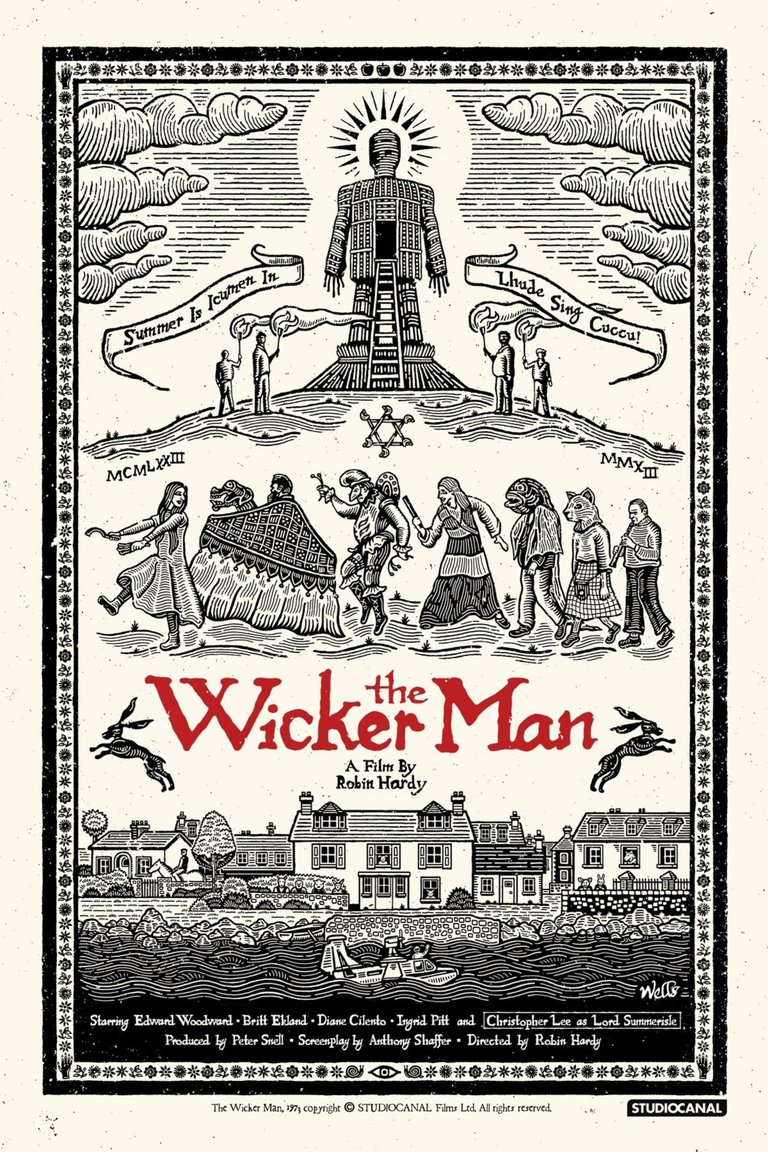
There have been a lot of really cool covers/posters made for this movie. It was so hard to settle on one that I decided to share the rest before we get started:
| Column 1 | Column 2 |
|---|---|
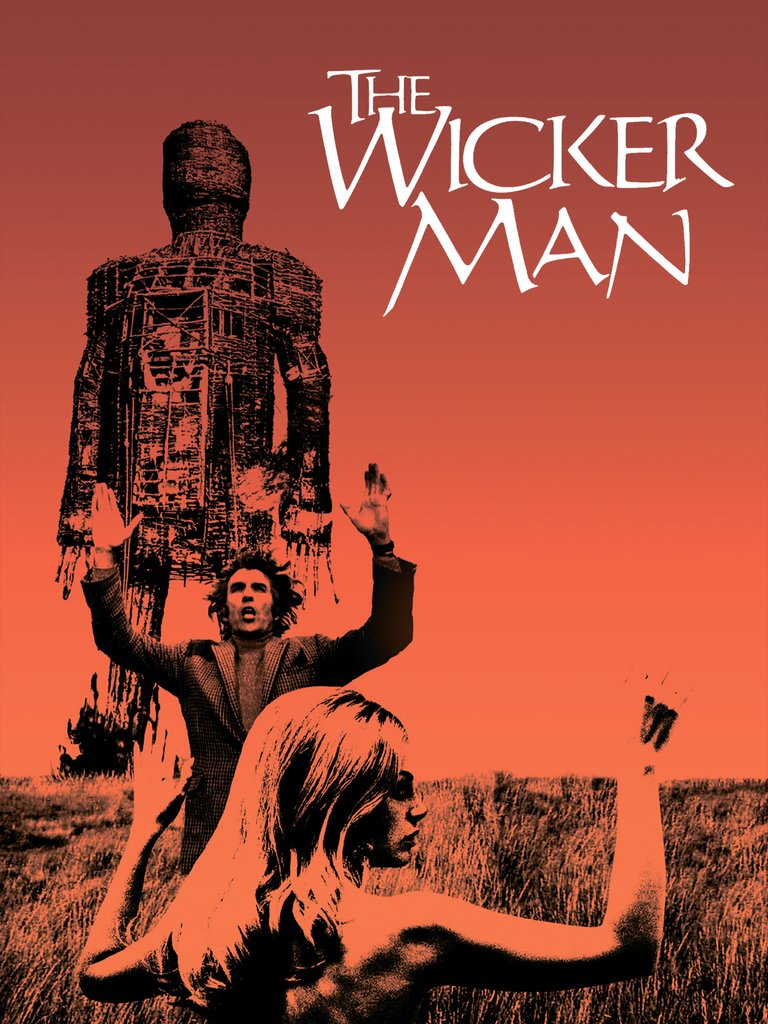 | 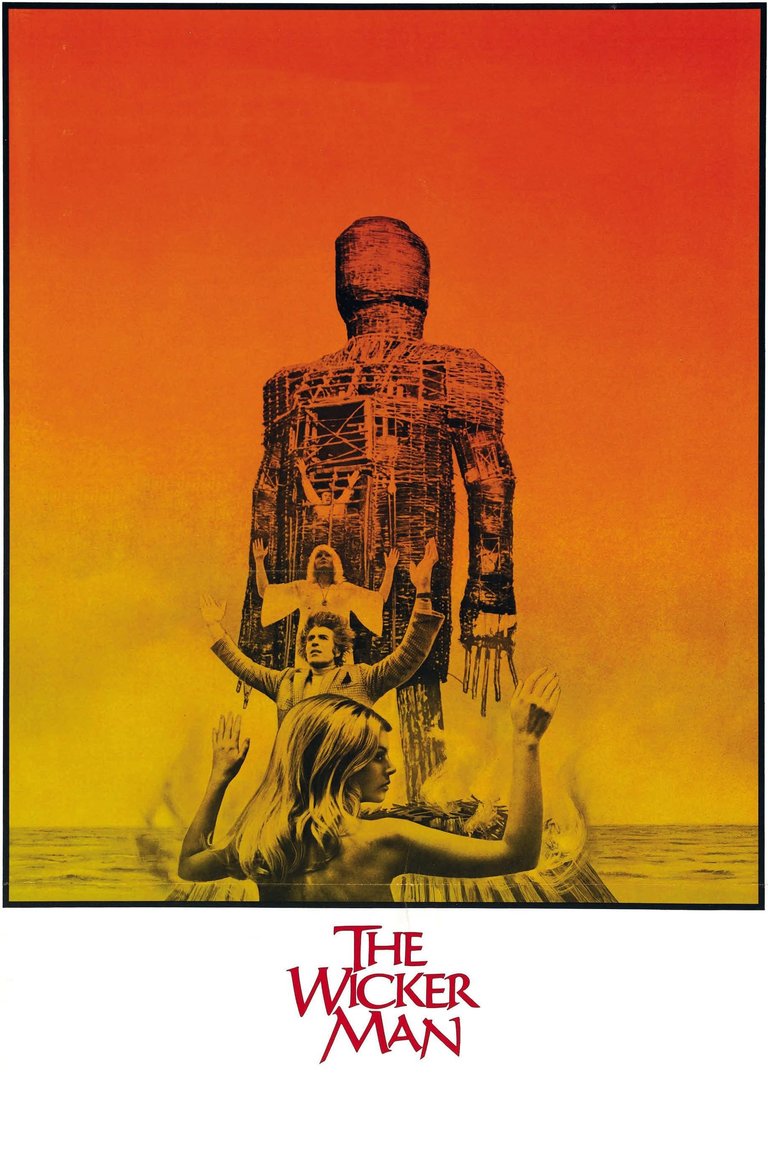 |
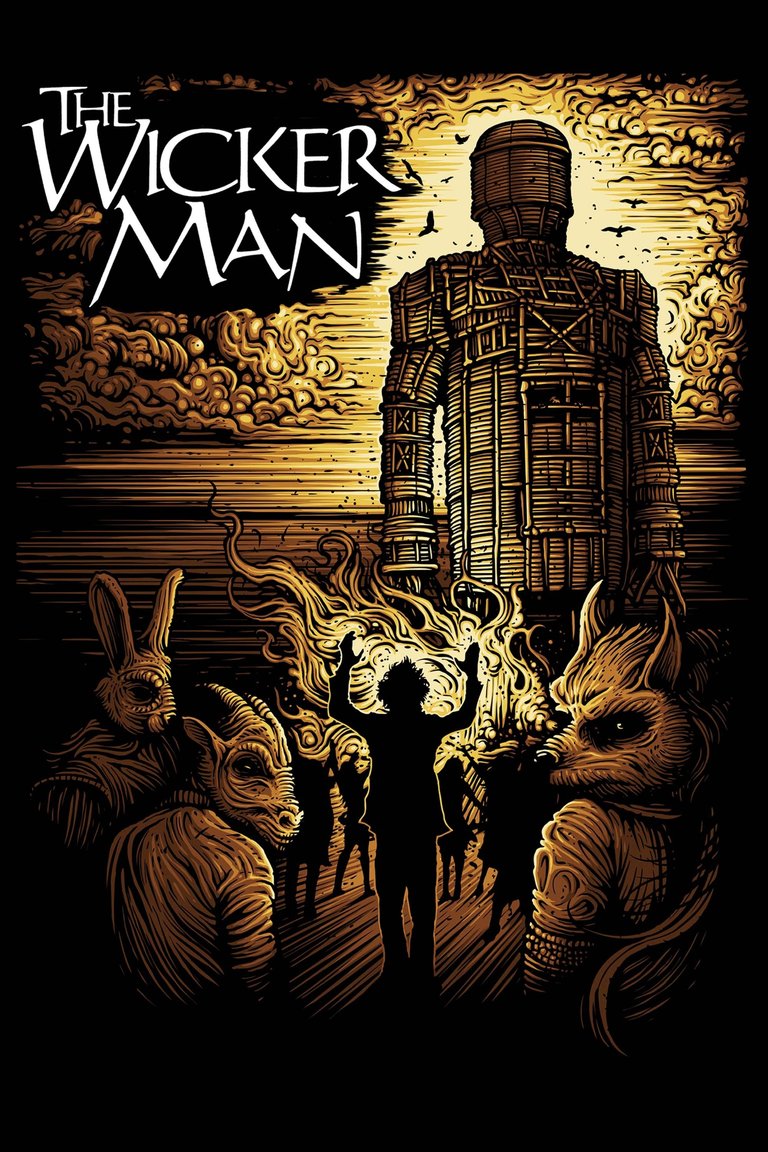 | 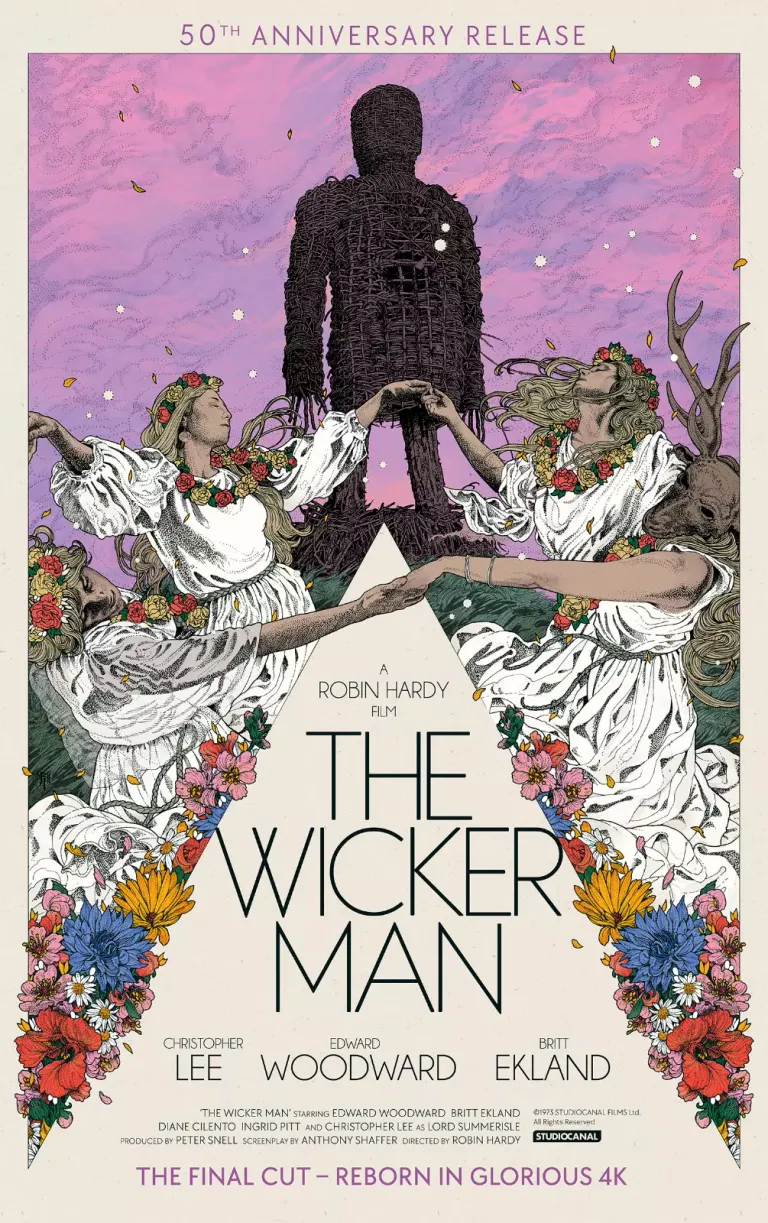 |
Details:
Title: The Wicker Man (1973)
Director: Robin Hardy
Produced by: Peter Snell
Starring:
Edward Woodward as Sergeant Edward Malus
Christopher Lee as Lord Summerisle
Britt Ekland as Willow
Diane Cilento as Miss Rose
Ingrid Pitt as Lorna
Arthur Lowe as The Constable
Genre:
Horror, Mystery, Psychological Thriller, Folk Horror
Introduction to the Cast of Characters:
The key characters introduced early on include:
Sergeant Edward Malus (played by Edward Woodward) – A devout, principled Christian police officer from the mainland who is called to Summerisle to investigate the disappearance of a young girl. He represents order, rationality, and religious faith, and his journey is one of skepticism and growing horror as he uncovers the disturbing reality of the island.
Lord Summerisle (played by Christopher Lee) – The charismatic and enigmatic ruler of Summerisle. He oversees the island’s pagan community and believes strongly in the power of fertility rites to sustain the island’s prosperity. Summerisle is polite, persuasive, and unsettling, offering a calm, intellectual demeanor that hides his ruthless determination to continue the island's ancient rituals.
Willow (played by Britt Ekland) – A beautiful and seductive innkeeper who takes a special interest in Malus. Willow is an embodiment of the island's sexual freedom and paganism. She attempts to lure Malus into a romantic encounter, all part of the island’s mysterious and ritualistic culture.
Miss Rose (played by Diane Cilento) – A schoolteacher on Summerisle who helps guide Malus’s investigation. While appearing somewhat reserved, Miss Rose’s behavior becomes increasingly strange, and her true loyalty to the island’s pagan practices is revealed over time.
Lorna (played by Ingrid Pitt) – A secondary character who is part of the island’s pagan rituals. Lorna is seen in a few scenes, adding to the island’s mysterious and unsettling atmosphere.
The Constable (played by Arthur Lowe) – A small but pivotal character who acts as Malus’s initial contact on the island. The Constable is one of the few islanders who openly acknowledges the bizarre customs but brushes them off with a casual indifference, contributing to the sense of unease that Malus experiences throughout his investigation.
The Wicker Man
The Wicker Man (1973) is a cult classic British horror film directed by Robin Hardy. It's known for its eerie atmosphere, thought-provoking themes, and what some would call an unsettling finale. The film blends elements of folk horror, mystery, and psychological thriller, set against the backdrop of a rural, pagan community. Here's a full breakdown of the plot.
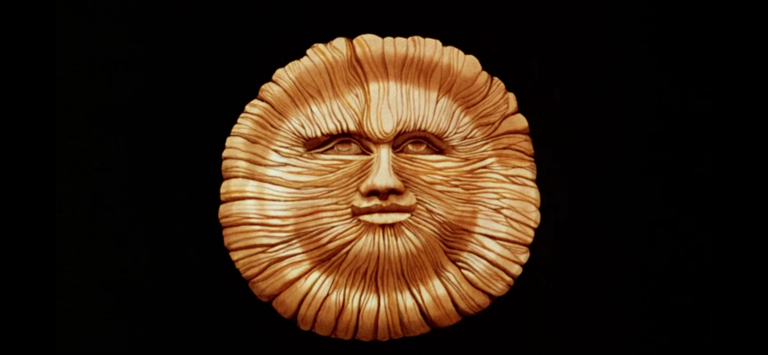
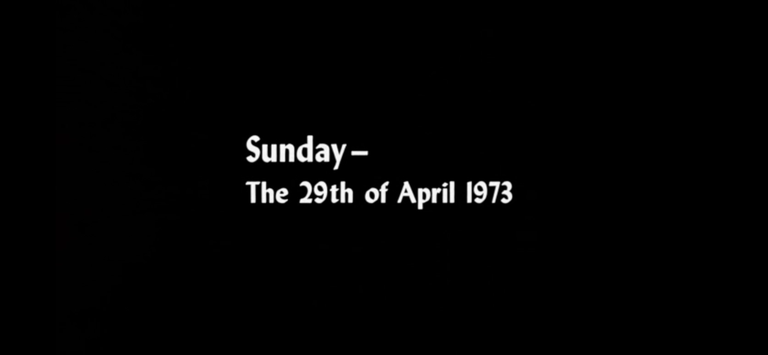
The Opening:
The film begins with Sergeant Edward Malus, a devout Christian police officer, receiving a mysterious letter while on duty in the city. The letter is addressed to him, written by Rowan Morrison, a young girl he has never met. In it, Rowan claims to be on the island of Summerisle, a remote part of Scotland, and she urgently asks for Malus’s help, stating that she is in grave danger and that the people on the island are planning to kill her.
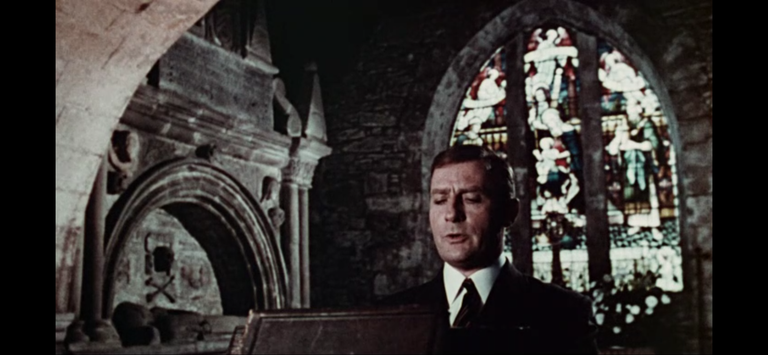
Intrigued and concerned, Malus boards a flight to Summerisle, a small, rural island known for its pagan beliefs and strange customs. As a devout Christian, Malus is skeptical about the island’s rumors of folk rituals and old gods, but his sense of duty compels him to investigate.
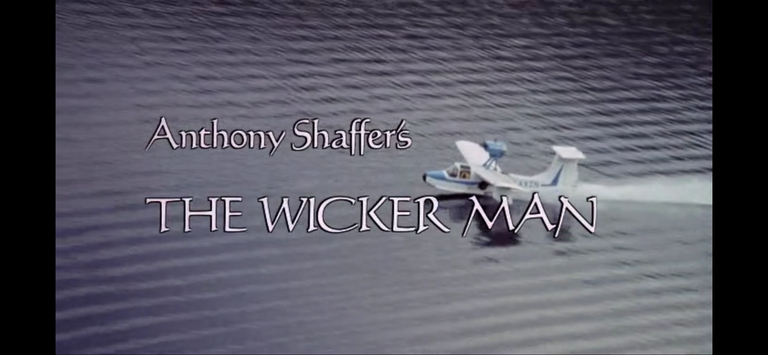
Arrival at Summerisle:
Upon arrival, Malus is struck by the island’s eerie calmness and its unwelcoming atmosphere. The village is small, isolated, and filled with strange customs and unfamiliar traditions. He learns that the island is ruled by Lord Summerisle (played by Christopher Lee), a charismatic but unsettling figure who claims to have revived ancient pagan practices in an effort to ensure the prosperity of the island.
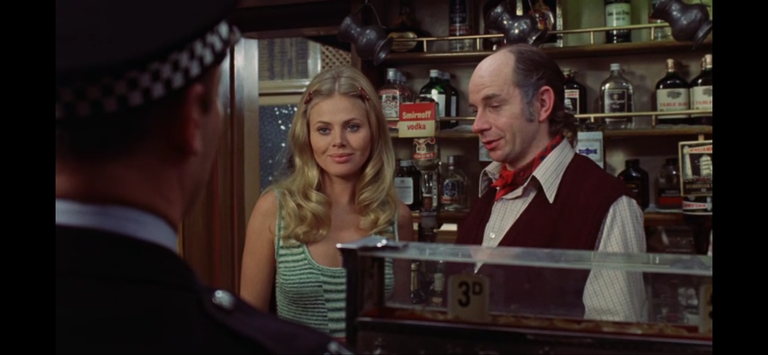
As Malus searches for Rowan, he finds the islanders’ behavior increasingly bizarre. The people of Summerisle speak openly about their beliefs in fertility, nature, and ancient rituals — practices that seem harmless on the surface but feel oppressive and mysterious. Many of the women on the island appear to have a sexual freedom that shocks Malus, and there is a pervasive atmosphere of hedonism and ritualism that deeply unsettles him.
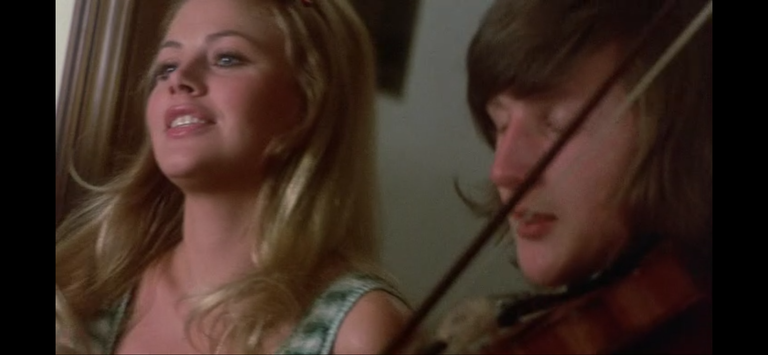
The Town’s Strange Customs:
Despite his confusion and growing suspicion, Malus remains focused on his mission to find Rowan. As he moves through the village, he is confronted with cryptic and evasive answers when he questions the residents about the missing girl. There’s no sense of urgency, and the people seem unconcerned about her disappearance. In fact, many of them suggest that she has simply run off and will return when she is ready.
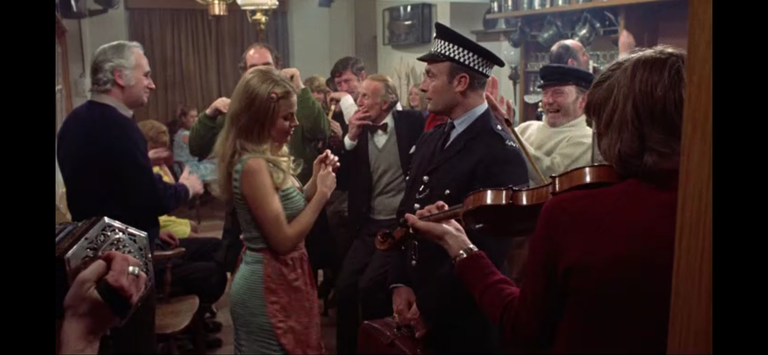
Throughout his search, Malus encounters Willow (Britt Ekland), a seductive innkeeper who seems to take an odd interest in him. Willow lures Malus into a romantic encounter, singing a haunting and suggestive song that reflects the island’s pagan nature. She invites him into her room and attempts to seduce him, but Malus, a man of strong religious convictions, remains distant, clearly uncomfortable with the advances.
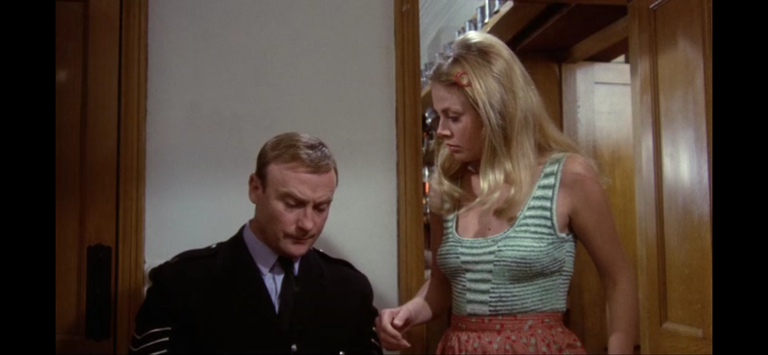
The Mysterious Lord Summerisle:
Malus finally meets Lord Summerisle, the island’s ruler, who calmly explains the island’s unique history. Summerisle tells him that the islanders practice a form of ancient paganism, believing that their prosperity depends on fertility rituals and offerings to nature gods. In a revealing conversation, Summerisle mentions that the community believes in cyclical sacrifices: to ensure a good harvest, they must appease the gods through rituals, including sacrifices. It becomes clear that Summerisle holds great power over the island, and his calm demeanor hides an unsettling intent.
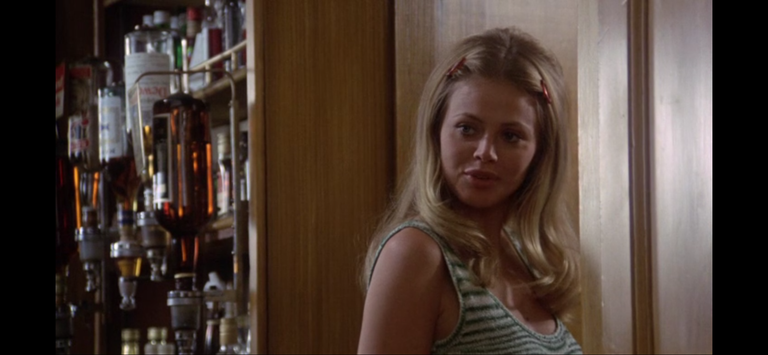
When Malus presses him about Rowan’s disappearance, Summerisle brushes it off, stating that Rowan is a part of the island’s ongoing rituals. Despite his polite and cordial demeanor, Lord Summerisle’s words are chilling, and Malus begins to suspect that Rowan’s life is in grave danger.
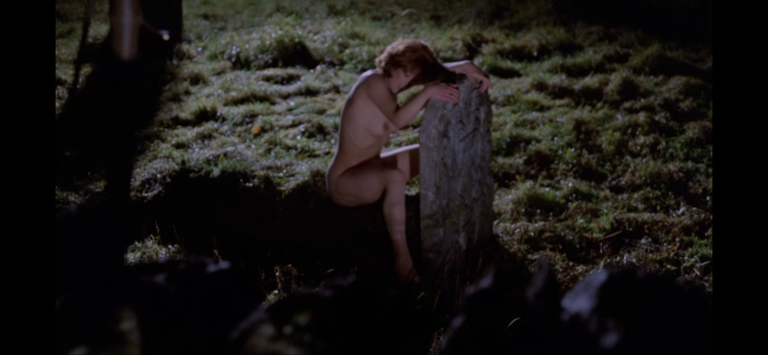
They've got this semi-hippie commune kinda vibe going on. The song this guy plays is interesting I suppose. I thought the guitar work was very clean and skilled. The lyrical development was somewhat juvenile I suppose, but then again he had a point to make and he made it.
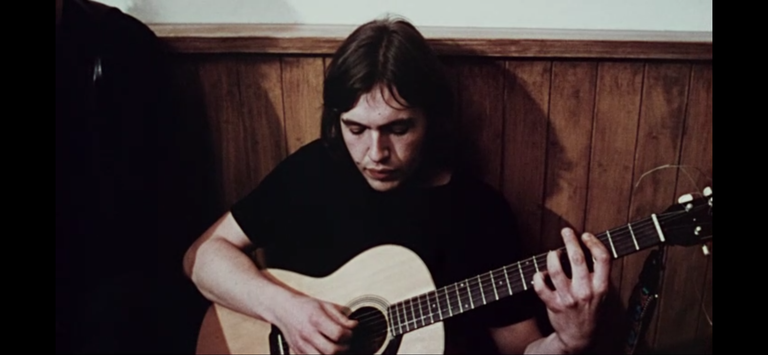
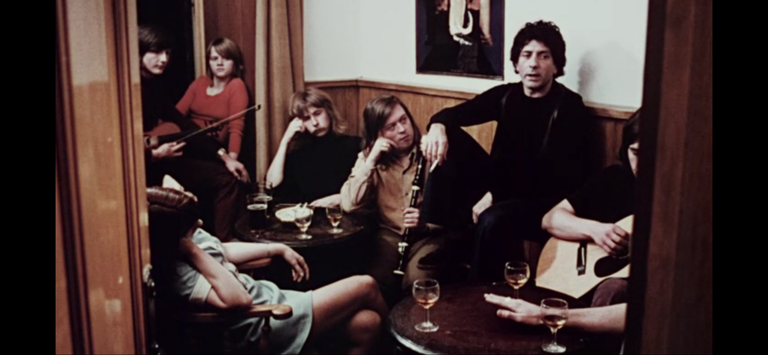
Willow seems to be perpetually interested in the detective. In the beginning, it seems like it might just be because he is new and carries himself with such poise and dignity, but as the plot unfolds, it becomes hard to avoid the sense that there is something more beneath the surface.
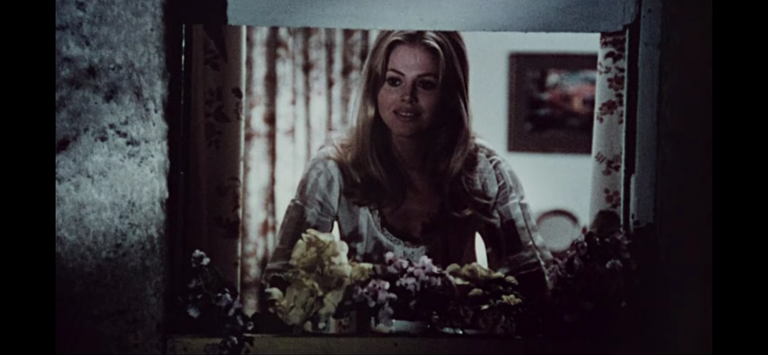
Lord Summerisle explains to the detective some element of their belief system. In particular, I came away with the impression that no other animal on earth bows to a god or to another of its own species, be it contemporary or thousands of years past.
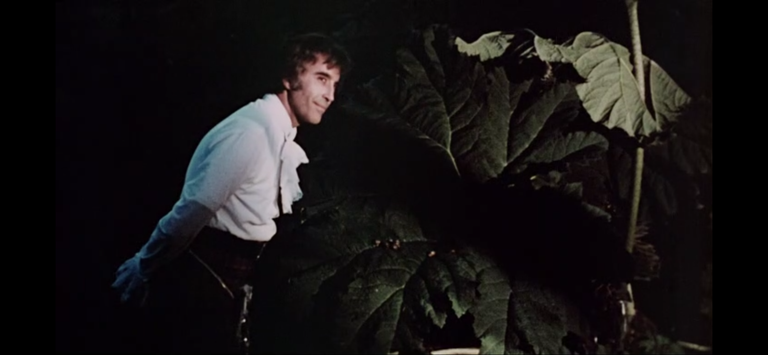
It seems the people of this island will offer sacrifice to appease the gods, but do not worship them in the way that Christians deify Jesus and worship the one most high.
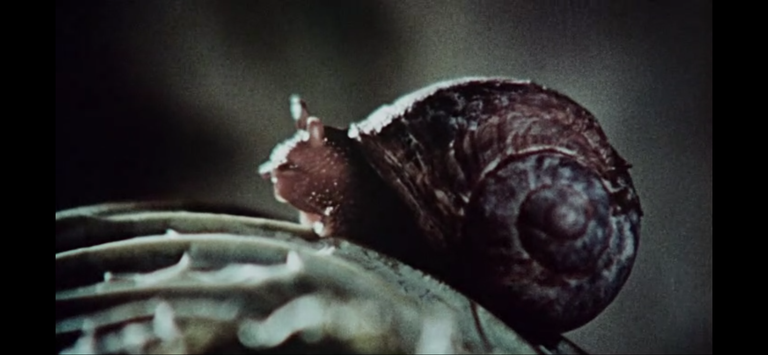
In the background of the film, preparations are continuously being made for the festival. Detective Malus is witnessing this all come together and, although it is all quite harmless on the surface, it is also plain to see that this is also most foreign and strange to him.
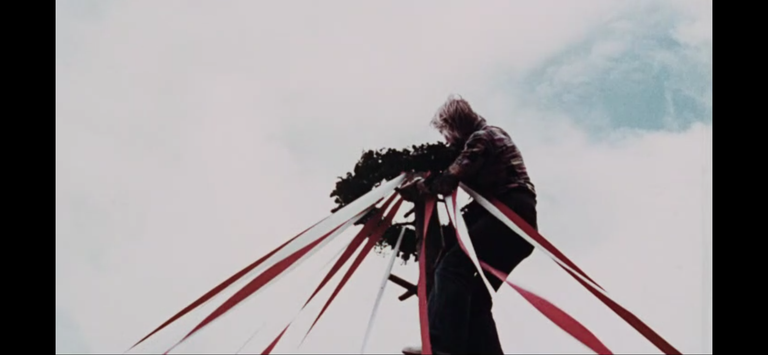
He spends some time with Willow, learning a little more about the customs and the upcoming festivities before moving on to question the townsfolk.
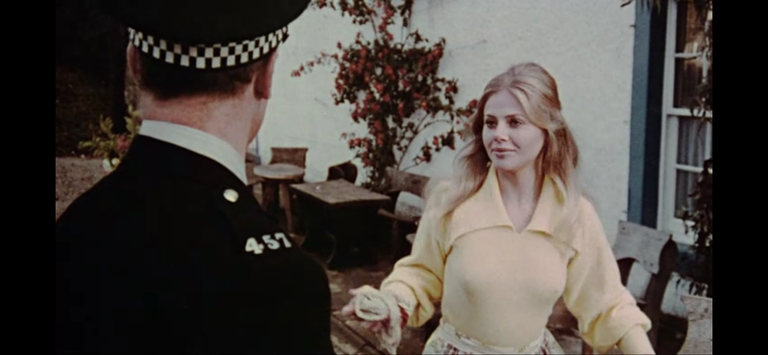
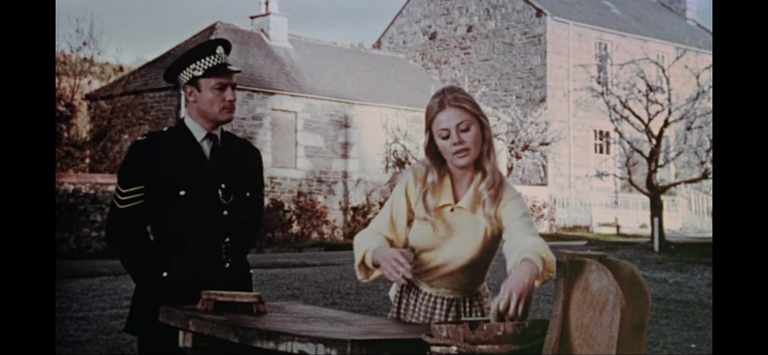
In the school, he tries everything he can think of to get information on the missing girl. The town's performance at this point feels haphazard and careless. it's like there's this massive coverup going on, but no one seems to feel all that pressured to help with the obfuscation.
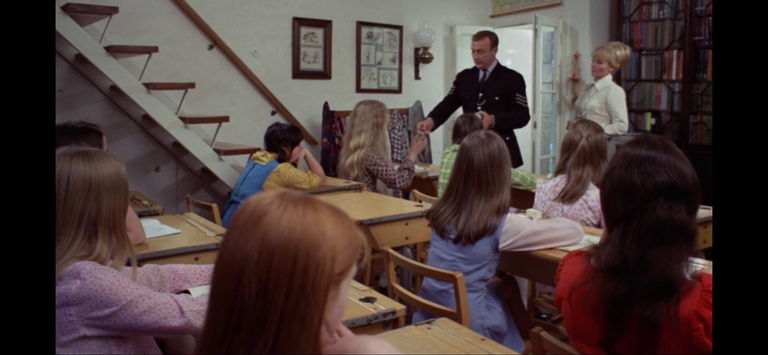
The kids deny knowing Rowan, but carelessly let little tidbits of information come one - and when they do, the rest of the people seem not to care in the way you would expect. It's odd because it feels like a lot of effort went into the coverup, a small amount of effort goes into upkeeping it, but when it begins to fall apart no one seems to panic or even give a shit.
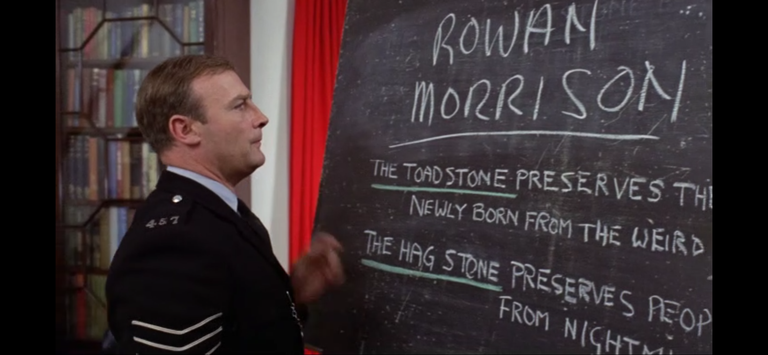
Malus chastises the teacher and the community at large for teaching the children Pagan concepts in school, but she don't give a damn.
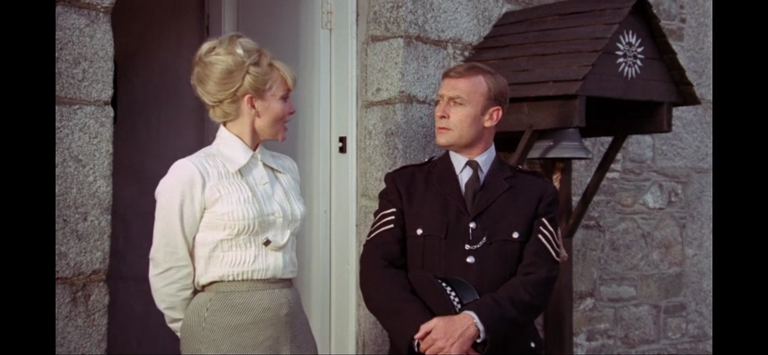
He goes to poke around in an old cemetery. I got the impression this had been around from the times when Christians had inhabited the island, but then there are some headstones that don't exactly coincide with that story.
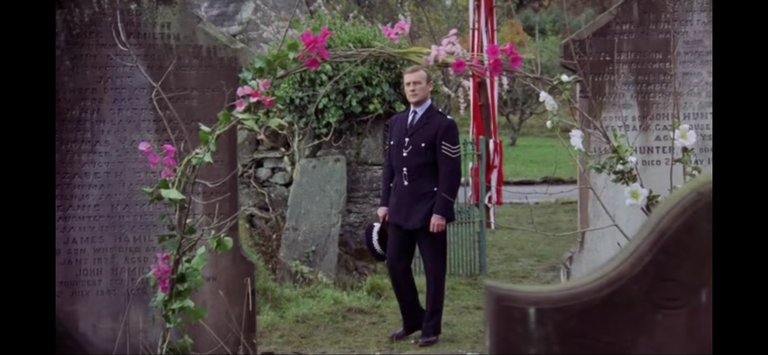
This one in particular caught me by surprise. I did a frame by frame through this scene so I could read all the headstones. This one says the guy is protected by the ejaculation of serpents.
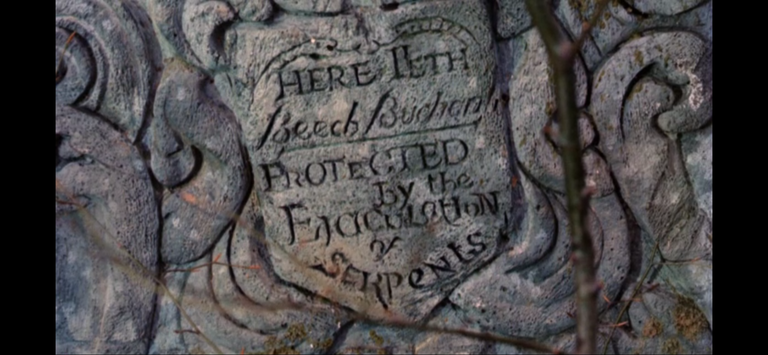
Next up, a nice looking skull and crossed bones headstone inscribed: Memento Mori" (Remember, you must die.) The skull appears to be flanked by an hour glass and a book?
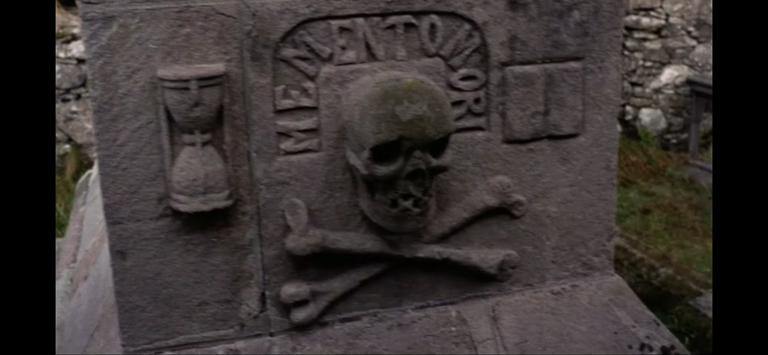
Next, it seems we travelled straight into a John Waters production, as we find some random ass Pagan chick breast feeding a child and holding an egg in the heart of the cemetery. I have no idea what this is intended to symbolize, but I also can't bring myself to fathom that it's there purposelessly, or just for effect.
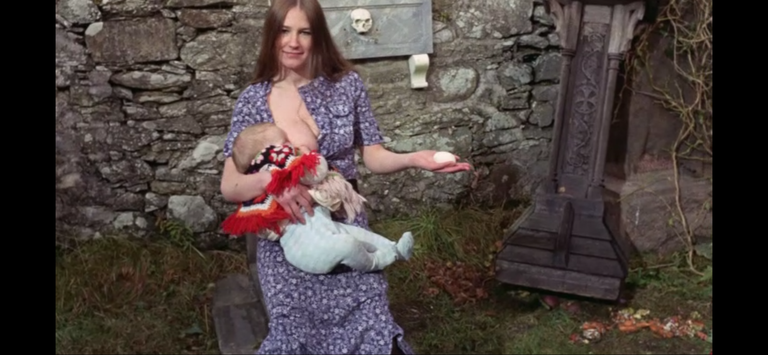
The detective sees the girls of the town conducting a fertility ritual around a small fire and we get a few shots of the incredible architecture that decorates the island.
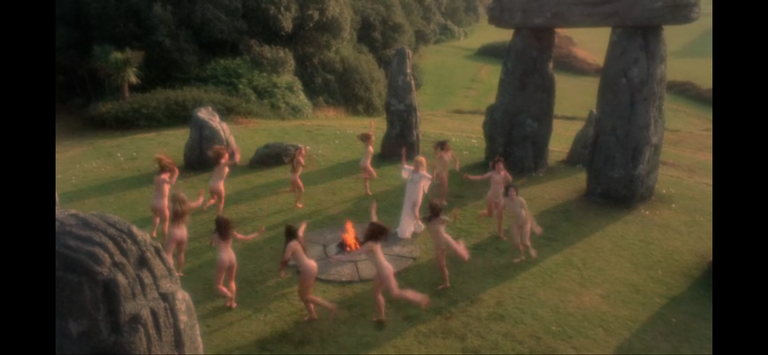
Along the way, someone lets slip that Rowan has died. Thinking he's finally cracked the case, someone has let slip the burial location of the missing girl. He must now leave the cemetery to get the permission of Lord Summerisle to exhume and examine the body.
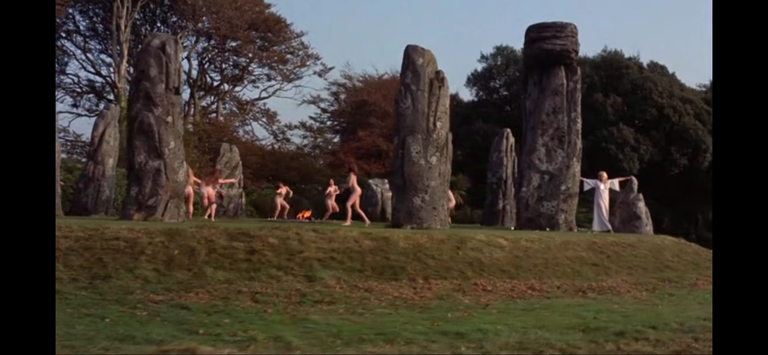
Are we to believe castles and structures of this nature were designed and built by people who run around naked and tie sticks together with twine? Is this supposed to be a remnant of the Christians that allegedly preceded the Pagans in inhabiting this island? I don't have answers at this point, but the questions seem to me to be worth asking.
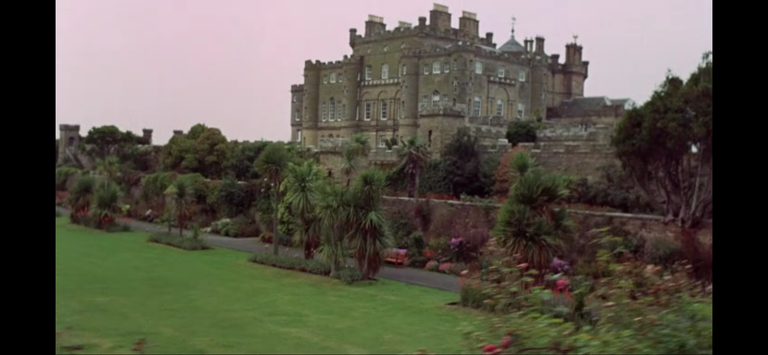
There is a nice path leading up to the building, surrounded by beautifully maintained gardens.
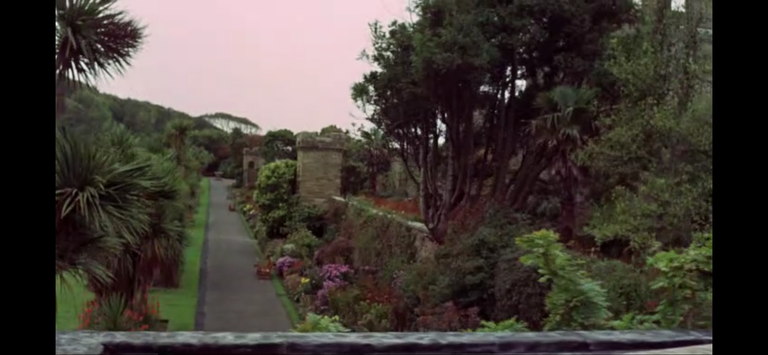
Even after zooming in, I couldn't make out much from this arch, but it looked to me like a great rabbit hole to jump in, so I set out to learn a little more.
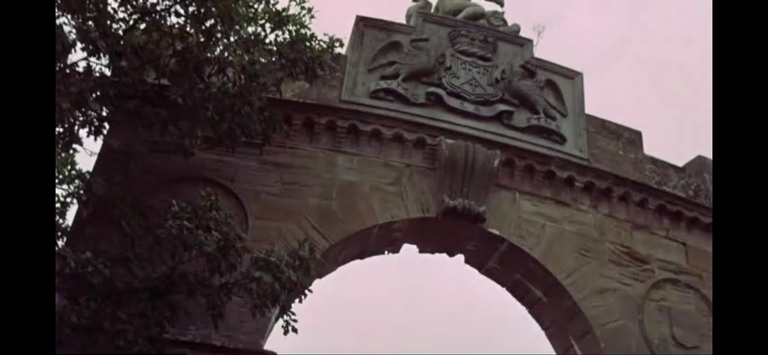
It turns out, the picture was not actually filmed on Summer Isle. Here is the actual castle from the movie:

I couldn't find the arch. I noticed when I zoomed in however, that the shield at the center of the crest does have three crosses on it, so it seems likely that this was either created or at least occupied by Christian forces at some point.
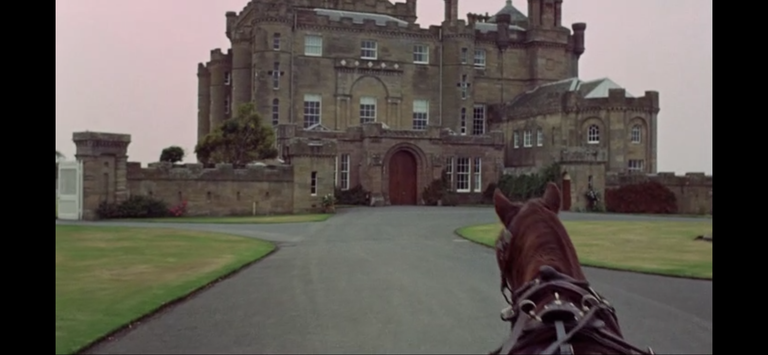
The building itself is filled with artifacts worthy of inspection, however I must at this point climb back out from the rabbit hole to finish the modest task which is my charge...that is, it's time to return our focus to the movie itself.
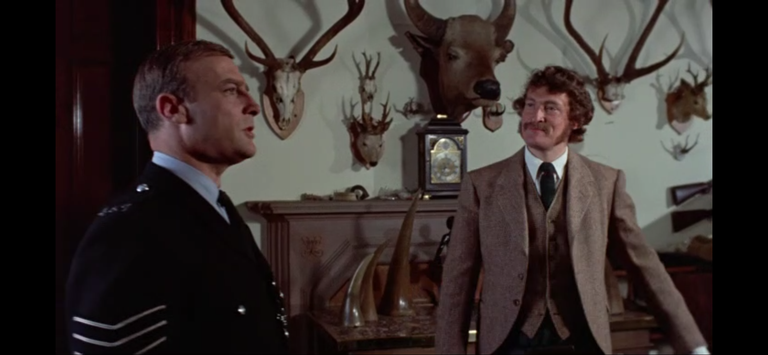
Malus seems as interested in these old artifacts as I am, if not possible a little less so.
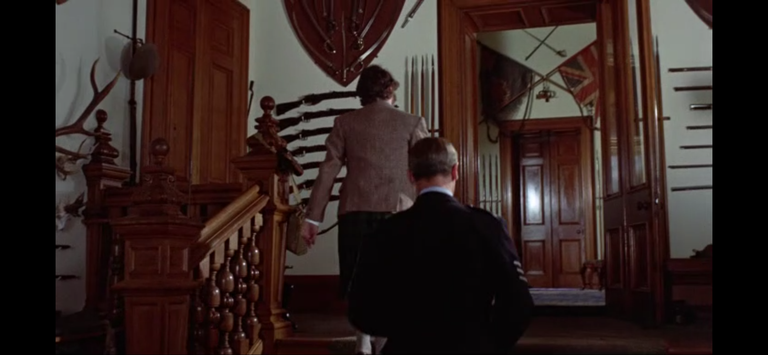
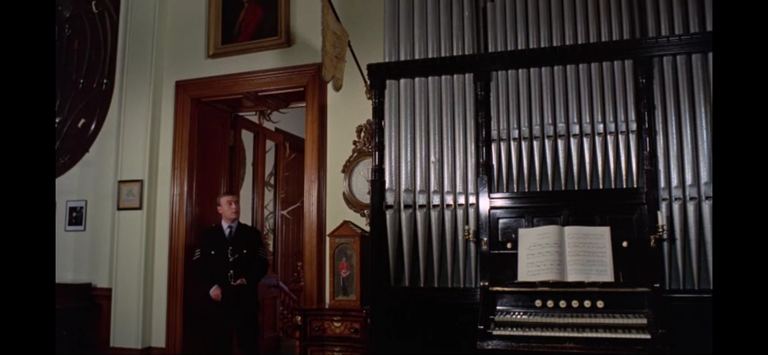
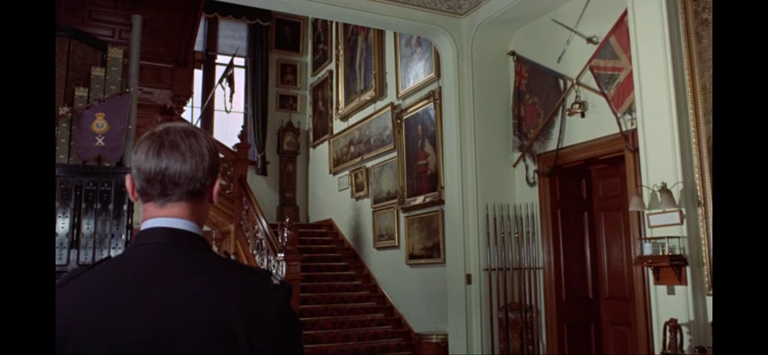
I tend to think most things don't make it into the shot by mistake. If it served no purpose, it would not be there. Of course, it's possible in this case that they filmed inside of a castle that's been turned into a museum of sorts, in which case they could control the focal point of the camera, but would not necessarily be adding or removing artifacts.
The shot below is interesting though, as we see a painting on the wall to his left and two still life paintings on the tables. These two have obviously been turned to optimally face the camera. I don't know what they mean, but I would bet money the director wanted them shown for a reason.
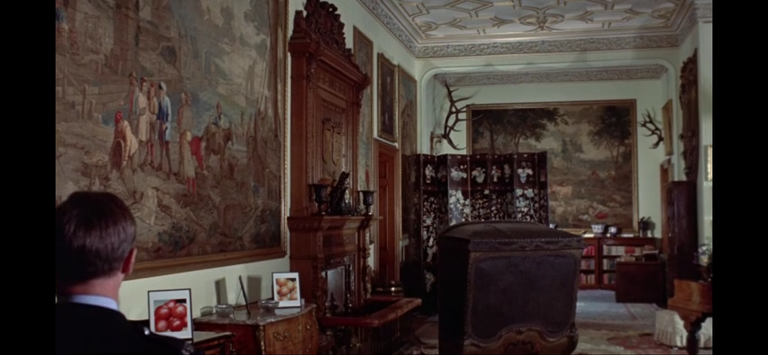
Once he's in Lord Summerisle's office, he looks out the window to see the continuing ritual.

Lord Summerisle suggests to him, isn't it refreshing to see their young bodies? to which the honorable detective plainly and flatly disagrees. In fact, he thinks it all to be absolutely disgraceful.
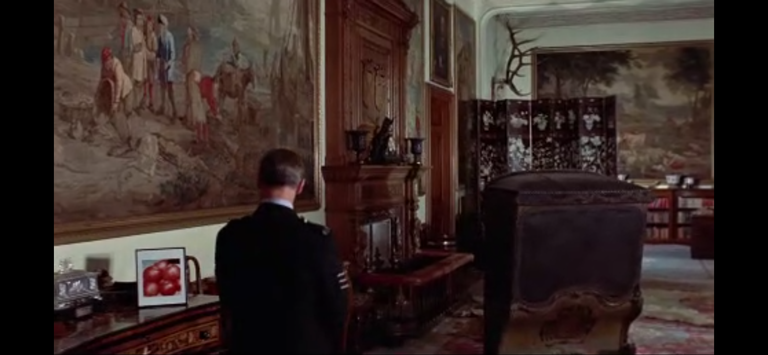
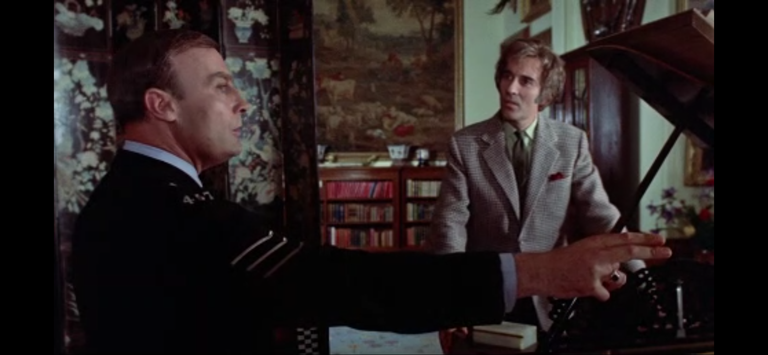
The camera next goes around and shares several dailies. We get to see a shot that informs us as to the greater orientation of the castle, which is nestled atop a seaside cliff.
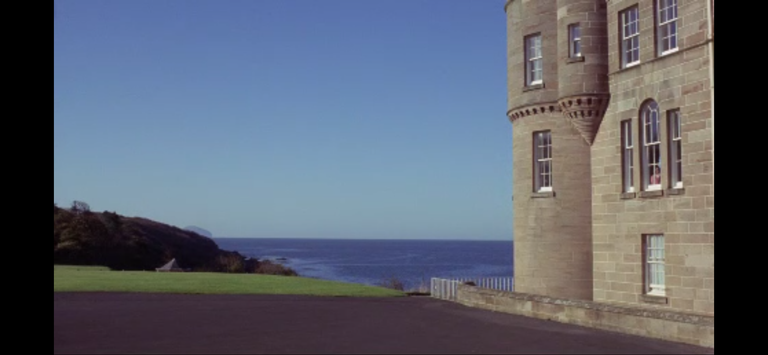
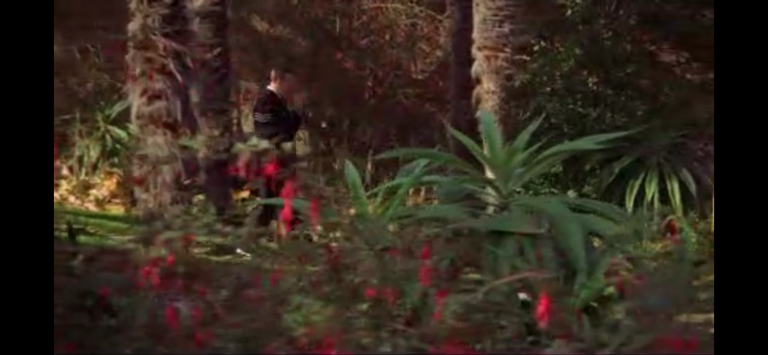
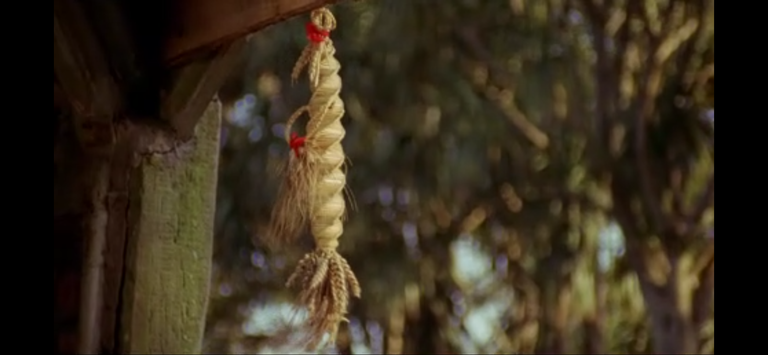
When he returns and digs up the grave, he finds a dead hare in the casket.
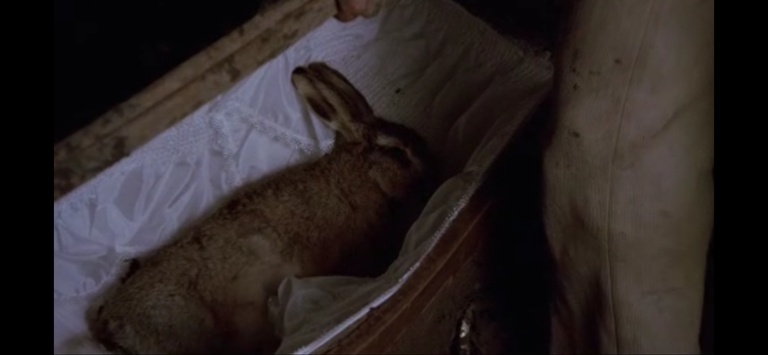
He brings the rabbit back to the town, where the people all seem to think he should have expected that. They've told him by now, Rowan became a rabbit.
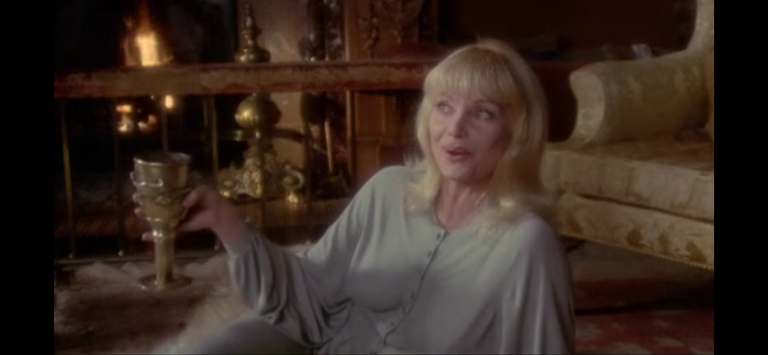
Digging through old boxes in the basement of the inn, Malus finds several photos of interest.
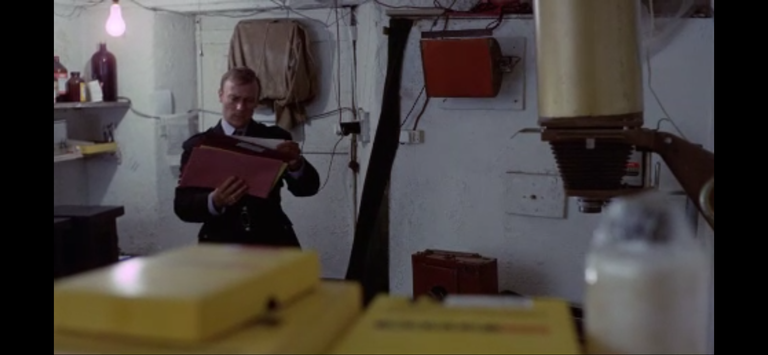
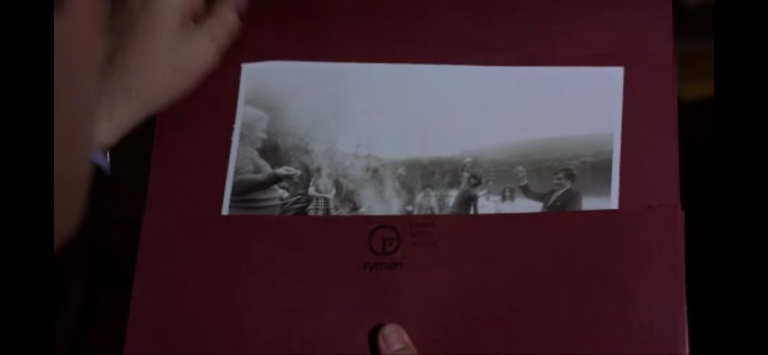

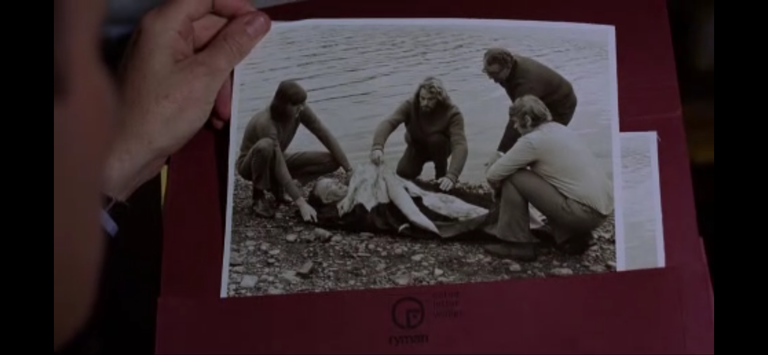
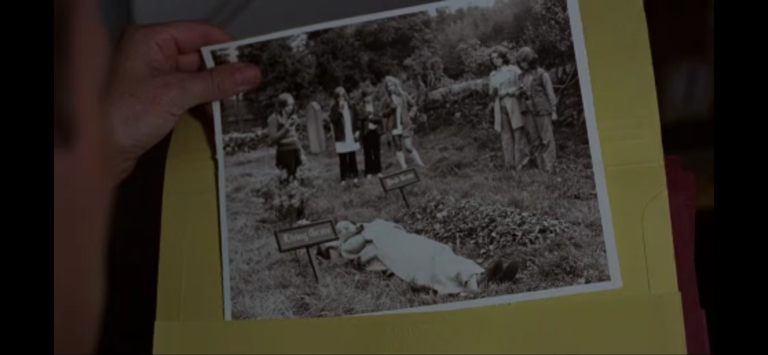
Although he doesn't find a copy of the photo that was missing from the wall in the inn (sorry, I think I forgot to mention that earlier...it's a lot to keep track of lol), he does find and develop the negative.
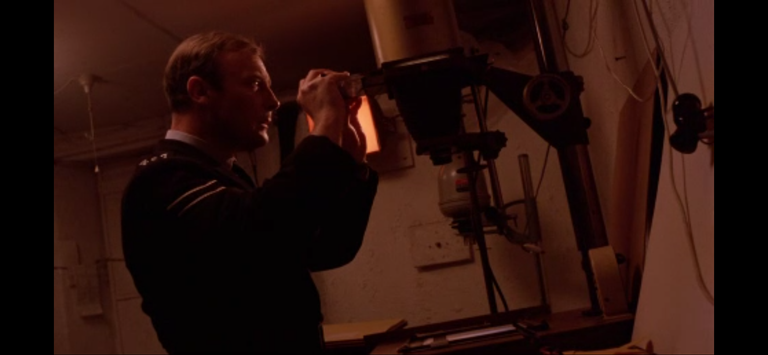
Every year they take a picture of the May Day queen with that year's harvest. It seems the missing girl was in fact the subject of that photo, and that the harvest that year was scant. All signs are pointing towards his suspicions being validated.
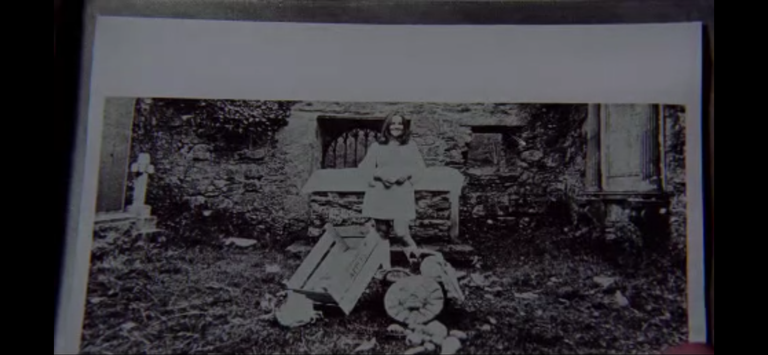
The Festival Approaches:
The islanders’ strange behavior escalates as Malus continues his investigation. The more he learns, the more alien the island feels. The women and children are seen performing fertility dances, and the men are engaged in bizarre rituals to encourage the fertility of the land. There are constant references to the importance of "the harvest" and "the crops." Malus is unable to understand the specifics of these rituals, but they all point toward one thing: the island thrives on the belief in sacrifice and the appeasement of the gods.
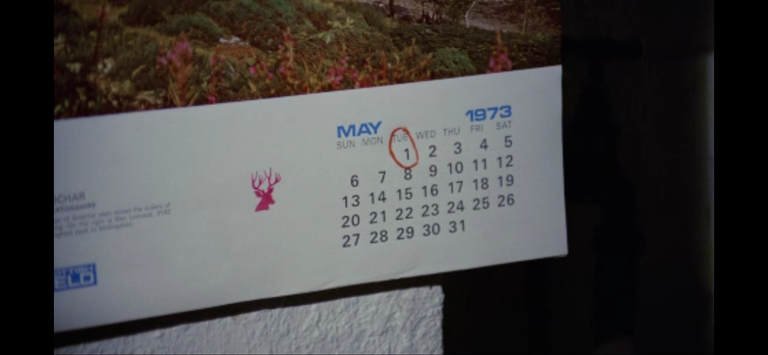
As the day of the Harvest Festival approaches, Malus grows increasingly desperate. He learns that the island has faced several failed harvests in recent years, and that the islanders are preparing for a grand sacrifice to ensure that this year’s crops will be plentiful. Malus believes that Rowan is to be the sacrifice, but no one will confirm it.
The night before the May Day ceremony, while Malus is in his room sleeping (note, the Pagans honorably never caused him any harm while he was their guest), Willow performs a seduction ritual to try to pull him into her.
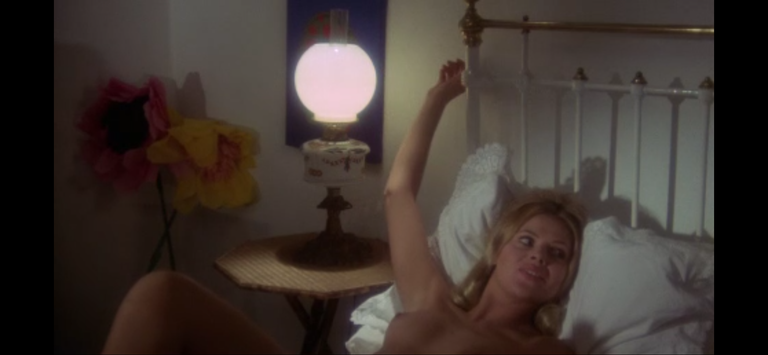

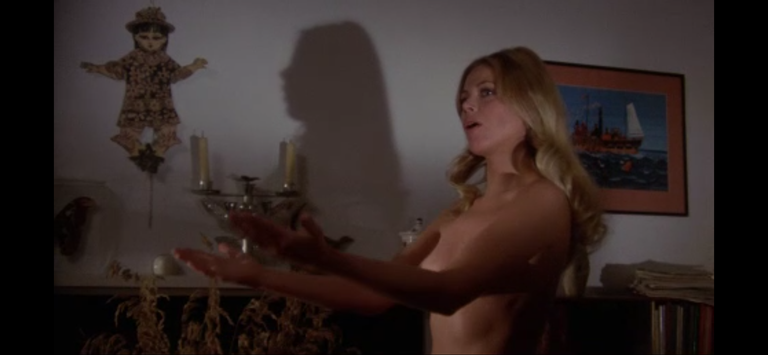
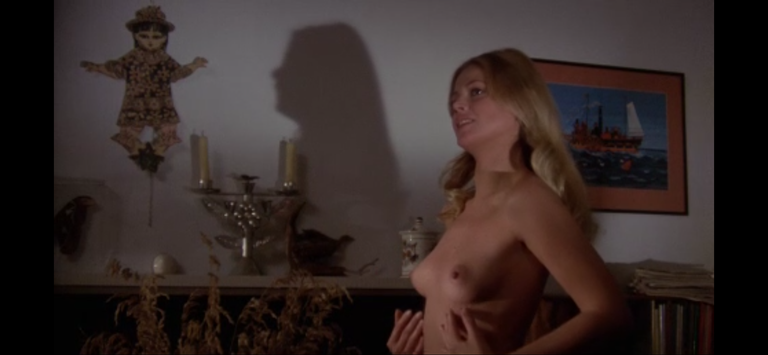
It starts with her tapping rhythmically on the wall. Shortly thereafter, she rises from her own bed and begins creating the sensations of sexual energy.
At the peak of the rite, she is doing some sort of nakey dance type thing that kind of reminded me of that Netflix show OA.
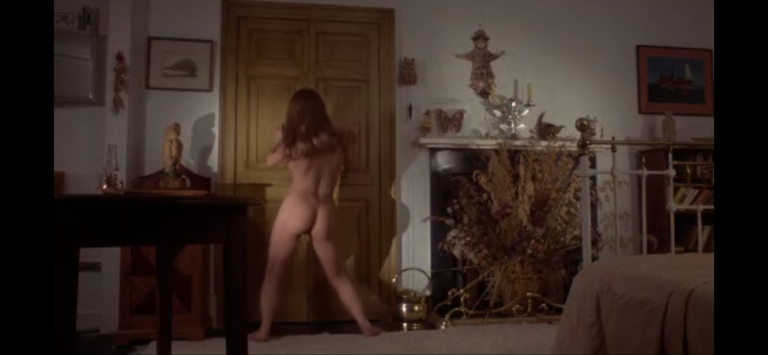
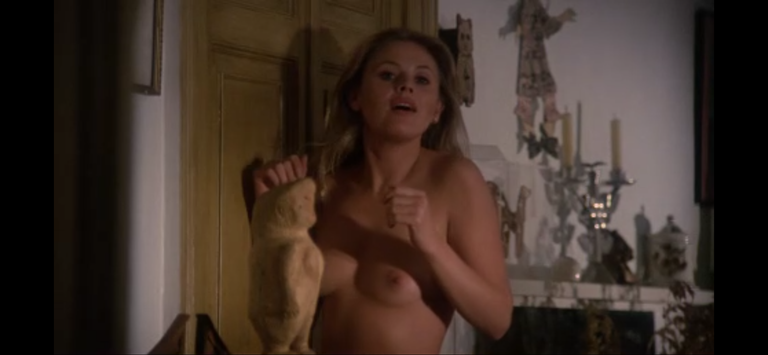
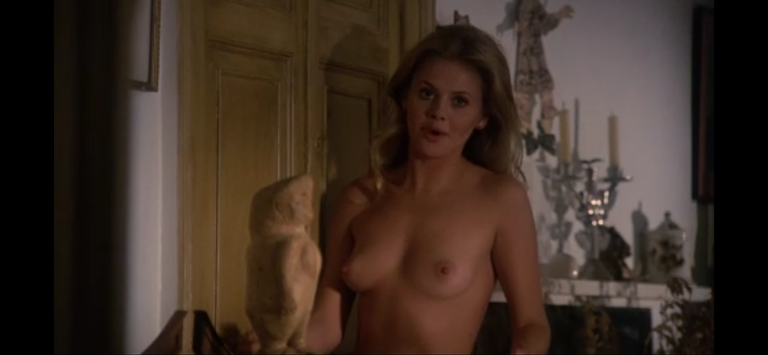
As the energy and tension builds, she approaches once more the wall that separates her from Malus. She cannot see him to know if her spell is working.
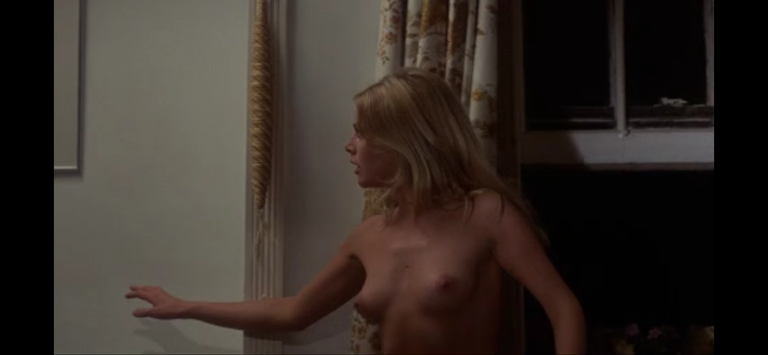
She places her hand against the wall, apparently channeling this built up sexual energy into his room, calling him wordlessly into her.
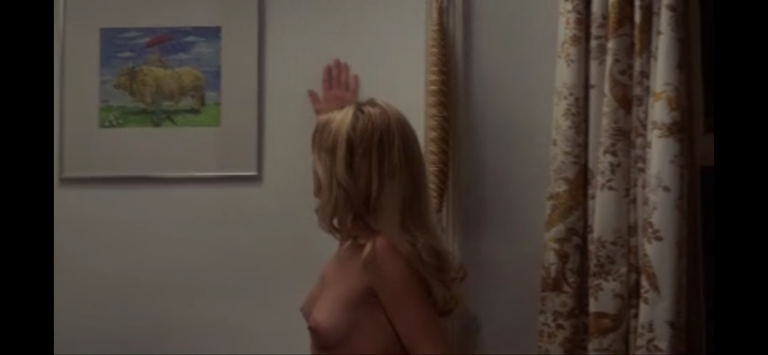

Malus seems inexplicable drawn towards the wall. It seems as though he feels the energy and is aware of the invitation as he sweats and struggles honorably against his own temptation.
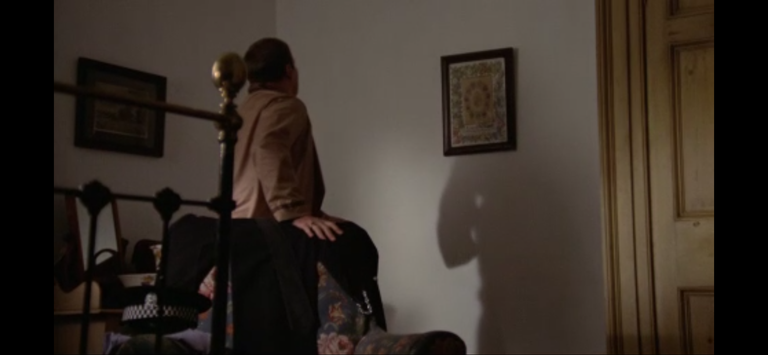
As Malus is engaged and locked into her spell, leaning against the wall that separates them, she kicks her strange interpretive dance moves into high gear...
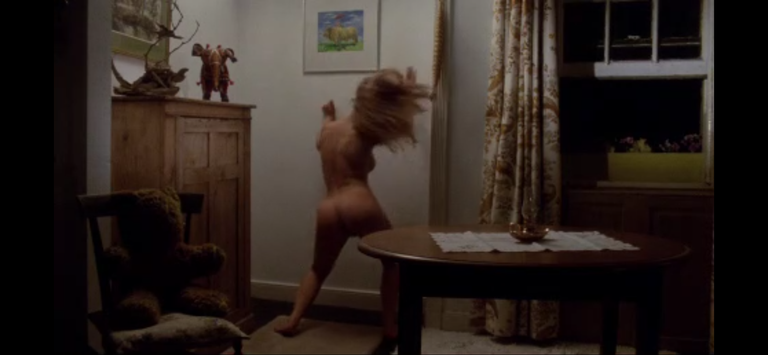
...this part gives of some definite final boss vibes as she builds his desire right up to the breaking point.
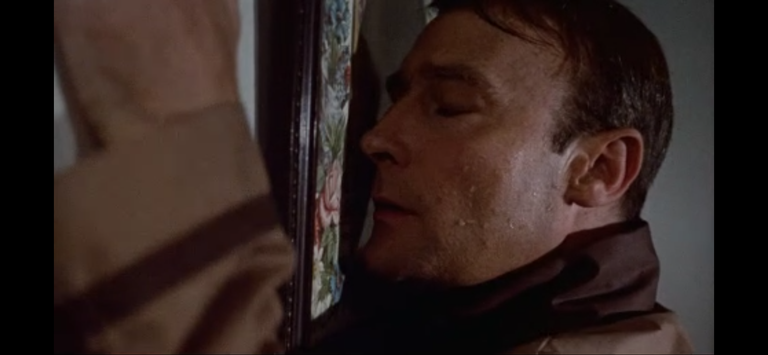
The scene almost feels intimate as she presses her body against the opposite side of the wall. Malus prevails, however, and is able to resist the temptation to take what is being offered to him.
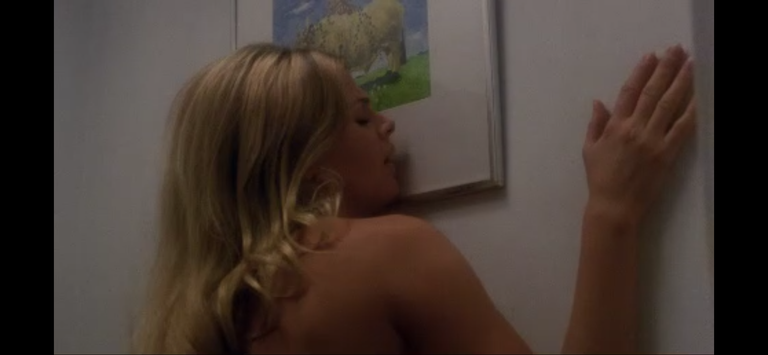
Willow comes into Malus' room on the morning of the May Day celebration and wakes him. Here she speaks somewhat plainly about what she had done the night before, but he doesn't acknowledge that he felt it.
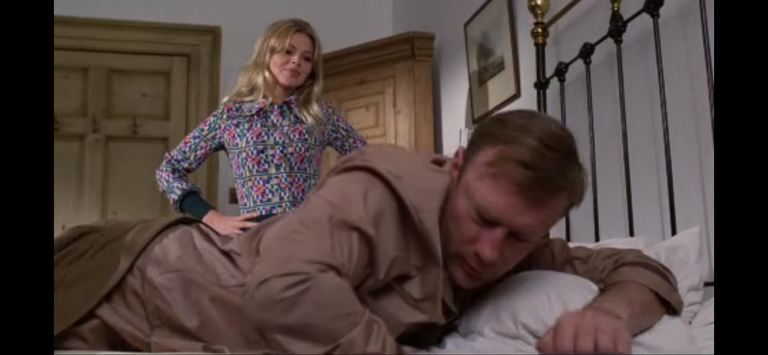
On the day of the May Day festival, Malus continues to investigate. His search is becoming somewhat frenzied as the festival is approaching and he is convinced that the young girl is intended to be sacrificed soon - he must find her before this can occur.
The island is awash with odd scenes and rites as the festival approaches.
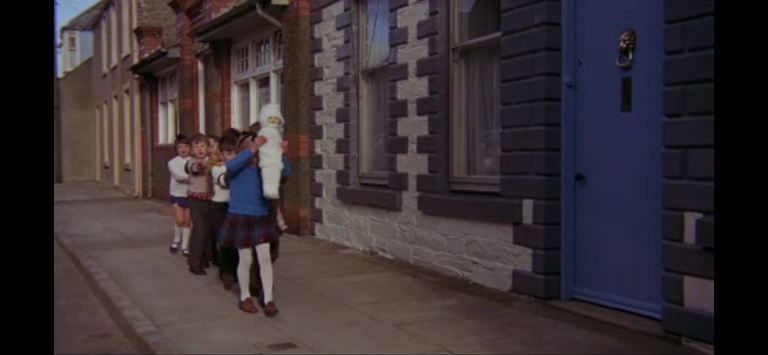
Malus reviews records in the public library, trying to discern what happened at the previous year's harvest festival.

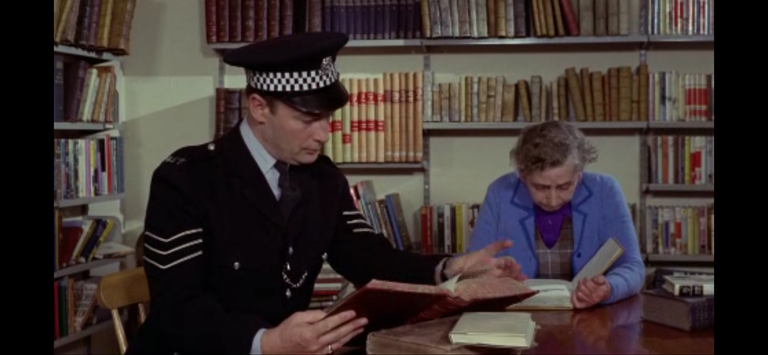
He finds some information on the May Day festival which convinces him not only that the girl is still alive somewhere, but also that she is to be sacrificed at the festival later this day.
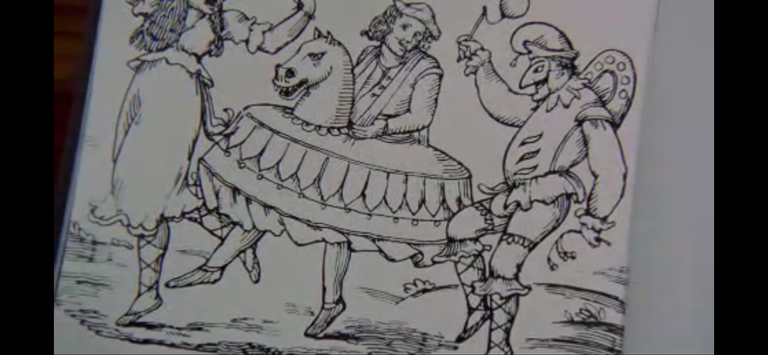
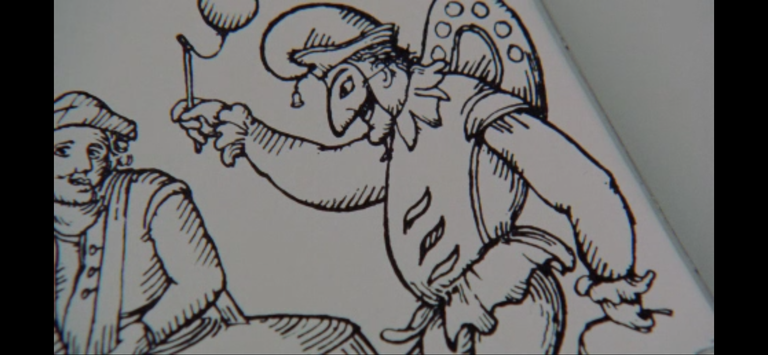
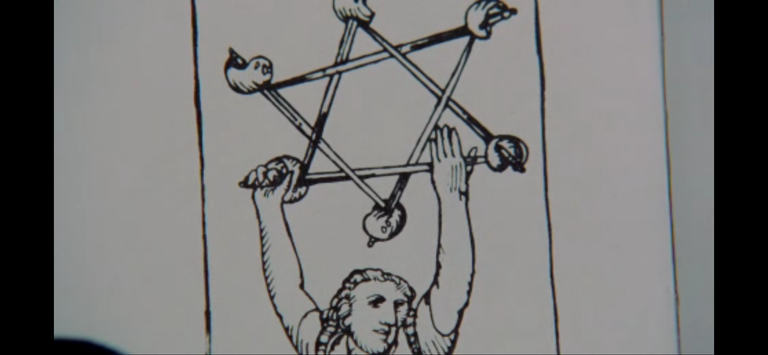
Malus decides he will fly back to the mainland to gather some more manpower for his search, but when he gets to his seaplane, it won't start.
Notice the all-seeing eye on the Summerisle dinghy...I'm not sure what significance this symbolism would have had to Pagans, but one interpretation I've heard for this symbol previously is that it represents the saying:
In the land of the blind, the one-eyed man is king.
This would certainly seem to be a potential homage to the manipulative and deceptive practices exemplified here, although there are many explanations available, in my mind I can only say I've found no confirmed explanations for the one-eye symbol...all I know for sure is that we see it everywhere, even today.
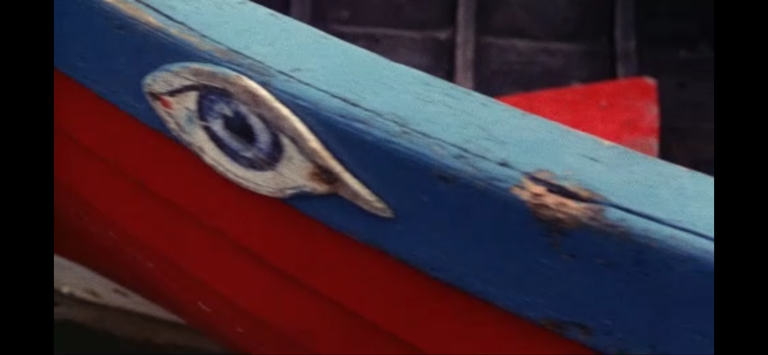
It does seem odd that Hollywood and media have also been known to control the thoughts and actions of large swarms of people through similarly deceptive practices, which in my mind is certainly a strike against the whole "Pagans are cool" narrative...but I sincerely don't know anything, and I'm not convinced that any of us do.

Next, as the day goes on, we see that everyone in town has their own mask/costume for the festivities.
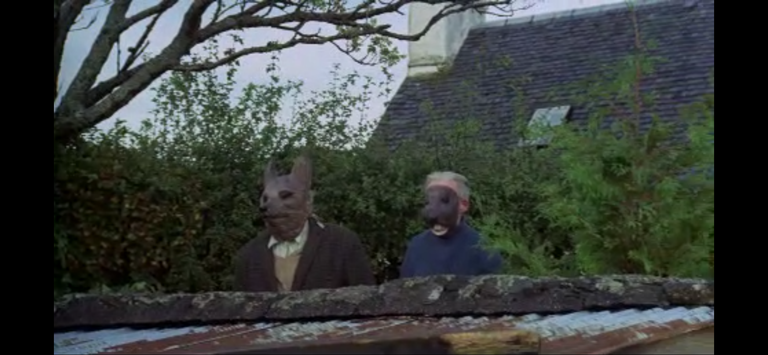
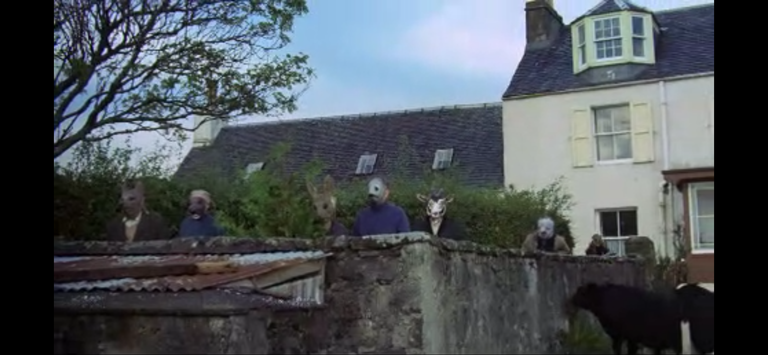
Again, I think of Pagans as being kind of more "salt of the earth" type folks, but time and again I see strange parallels to the modern wealthy classes, which seem steeped in occult ritual...in this case specifically, it reminds me of the Rothschild Surrealist Ball.

...Anyway, getting back to it, the locals of Summerisle kindly give the detective a ride back to his seaplane, but it seems someone may have sabotaged the vessel while the detective was unawares.
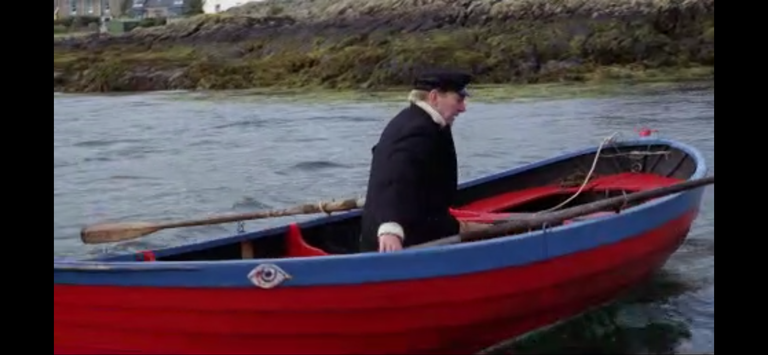

The locals are all preparing for the festival now when the detective has returned to shore. He is now almost frantic as he tries to cast a wide net and scour the island for the missing girl.
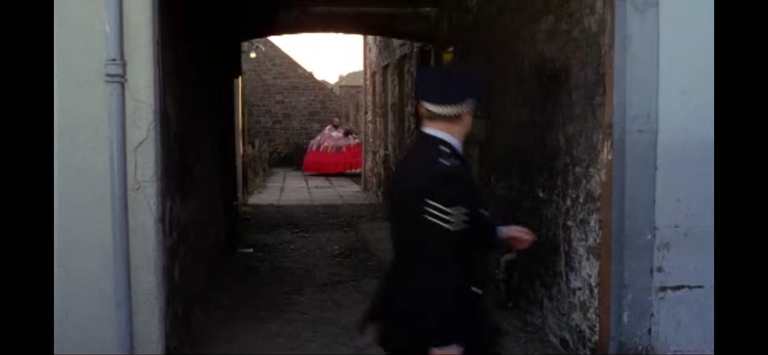
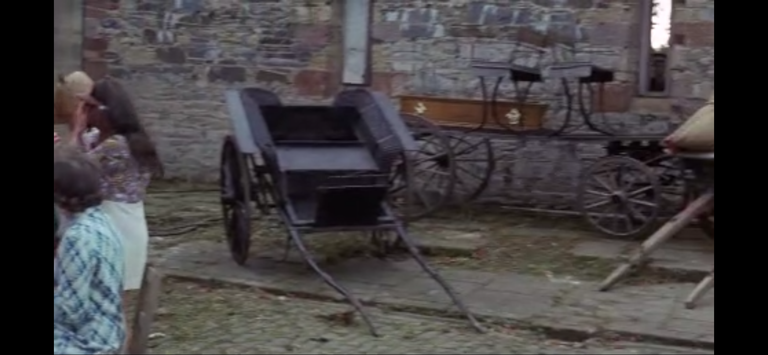
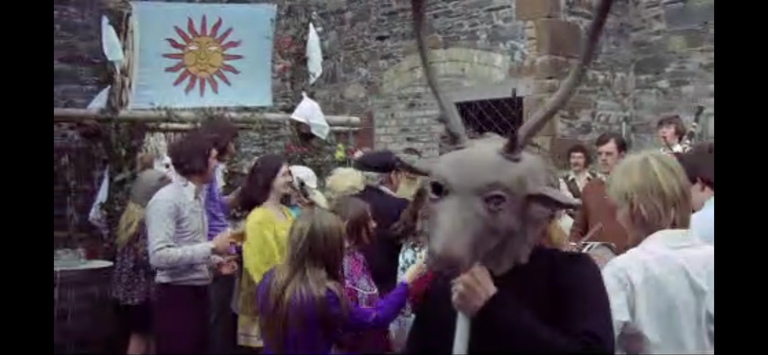
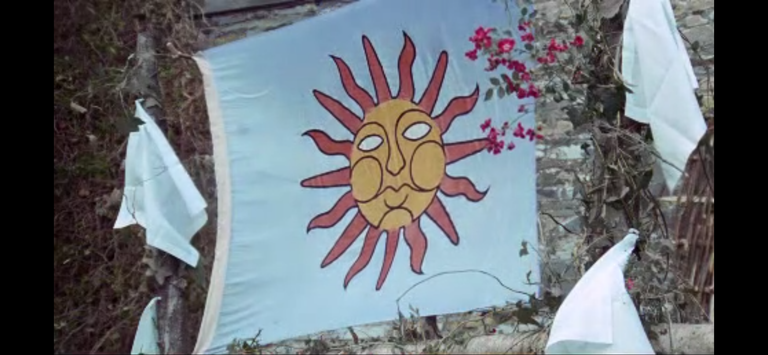
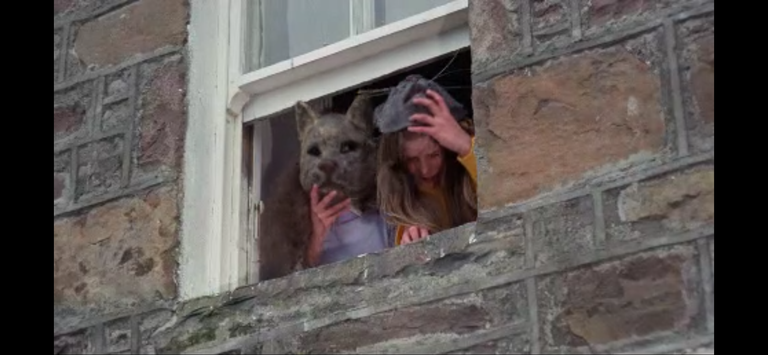
In his frenzy, he begins breaking into all the houses on the island, where he finds all manners of strange things. It's pretty much all harmless, but it's also creepy and doesn't bode well for the situation in general.
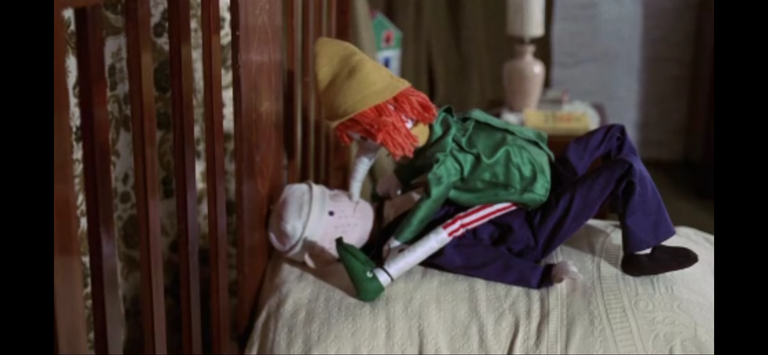
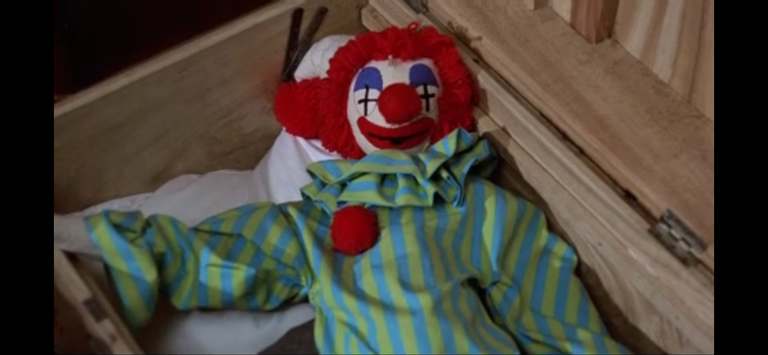
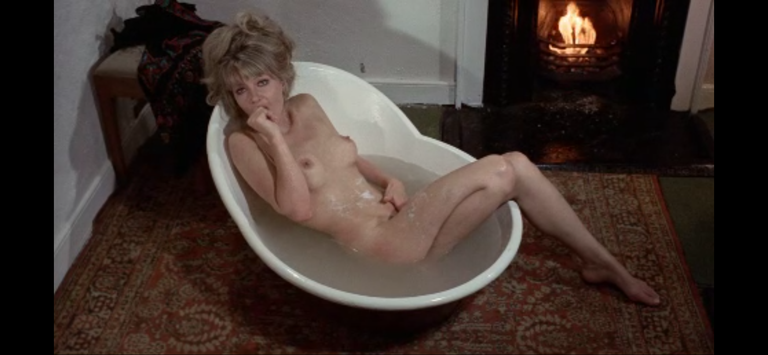
He spots a large boat off shore. This is the boat used by the locals to ship/sell their produce to the mainland.
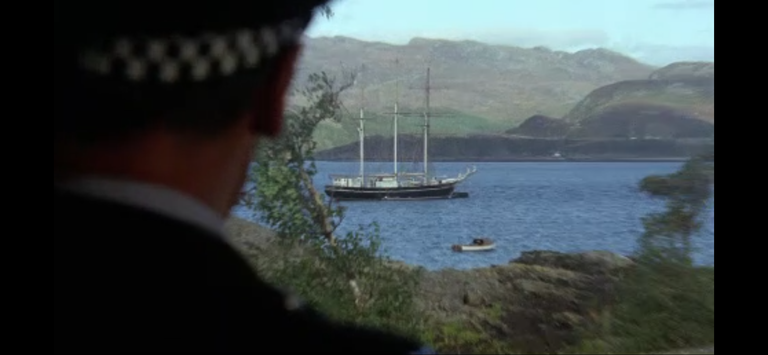
Honestly, I'm embarassed to admit that at this point I had not figured it all out. In the picture below, I saw the bound and wrapped rigging at the bow of the ship and thought That's her!
...if you saw Midsommar, you know that in that film, almost all of the sacrifical offerings were killed prior to the festival. Their bodies were doctored and cured and modified or whatever to dress them for the ceremonial pyre, so I thought, maybe they already killed her and will only be burning her body at the ceremony....oh how foolish and naive!

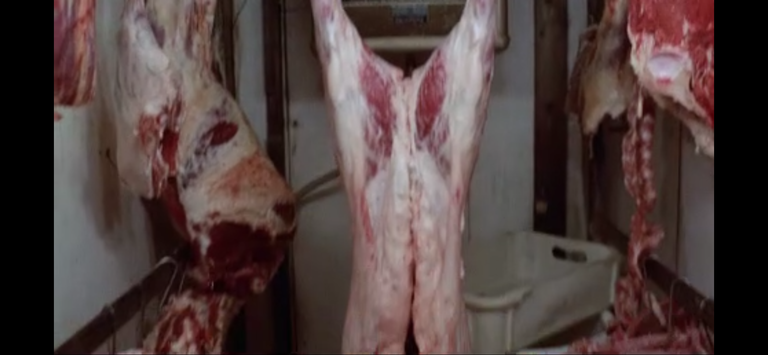
When his search comes up empty, Malus finds his way back to the inn to find the people there preparing for the ceremony. They make ominous comments about how he should probably not come. It seems they're confirming his suspicions.
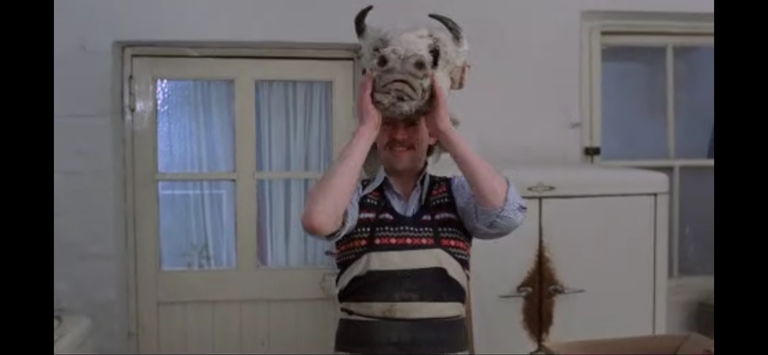
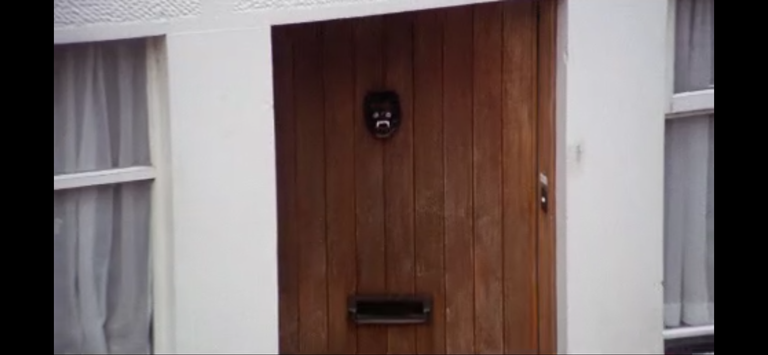
The streets outside are clamoring with activity as the ceremonial parade begins to form up.
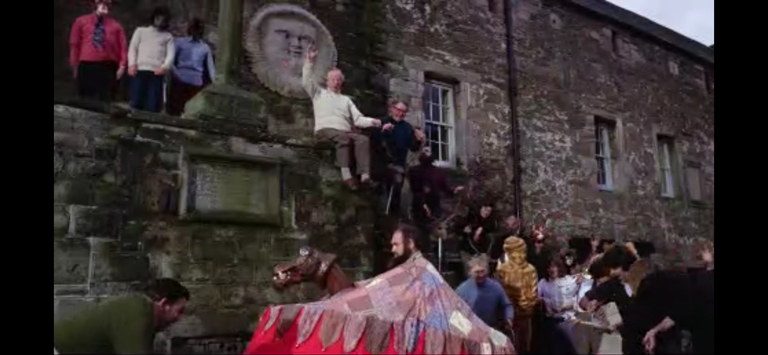
Willow is making final preparations at the inn. Her father comes in and they discuss how they will handle the "detective problem" essentially.
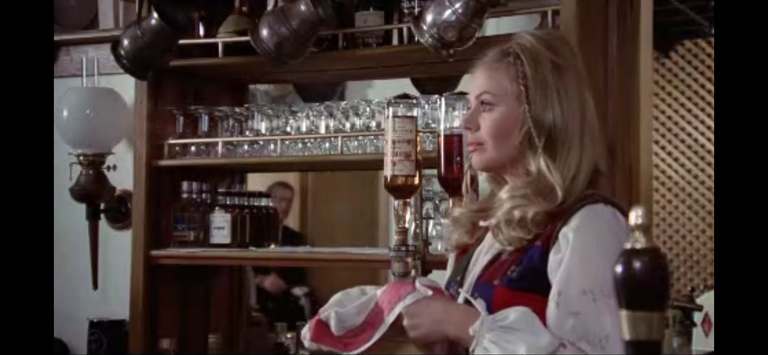
She looks in on the detective, who pretends to be sleeping.
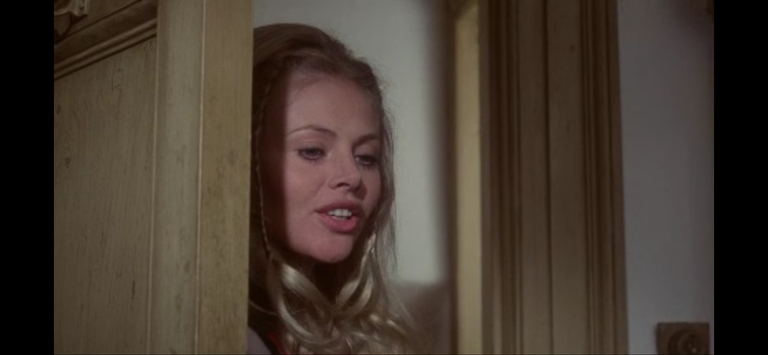
Willow and her father discuss how they will ensure the detective sleeps through the ceremony, They hold this discussion right outside his door. As I was watching this, I thought, even if he were truly asleep, wouldn't you want to exercise some small precaution and have this discussion elsewhere???
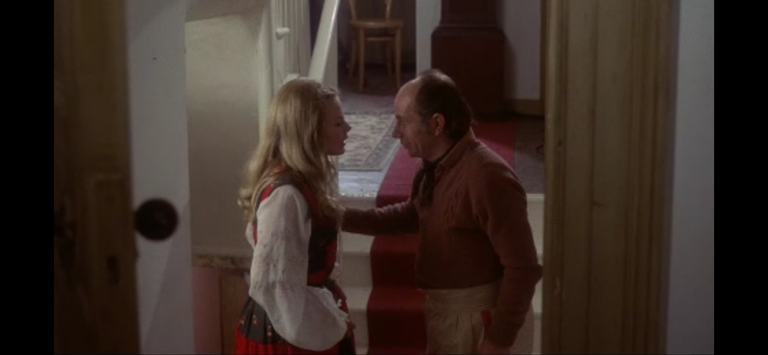
Of course, they put something in the room to ensure he sleeps, and then hastily take off. Malus, having never been alseep in the first place, gets out of the room before their plan can take affect. He finds Willow's father, the innkeep, dressing in his costume as The Fool; he whacks him in the back of the head, knocking him out and taking his costume before joining the celebratory procession in cognito.
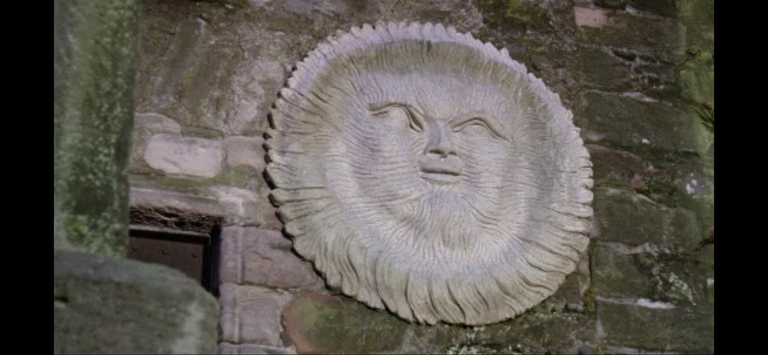
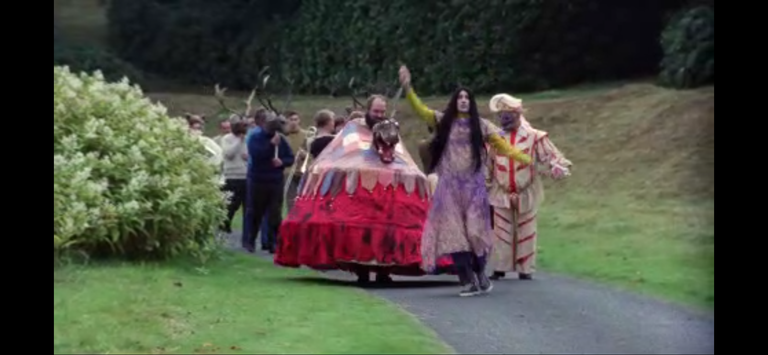
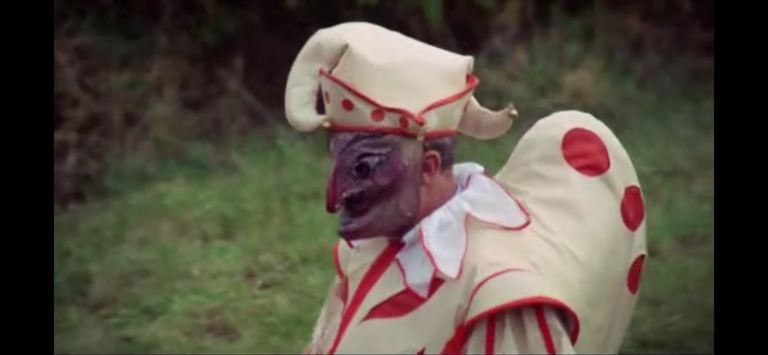
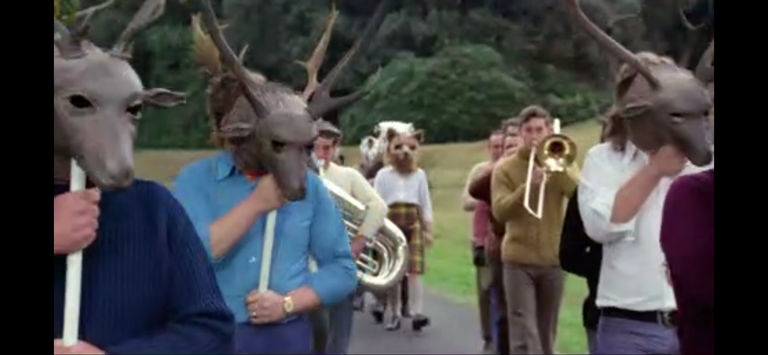
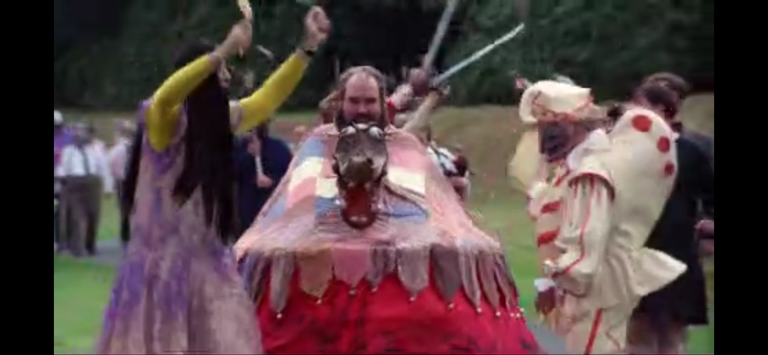
The swordsmen of the parade form a Star of Remphan with their swords over an altar, just as shown in the book Malus found.

Here, all the members of the parade/town must pass through and place their head through the center of the star.

It is portrayed as though this is a game of chance that will result in someone being beheaded, but this turns out to be ceremonial only.
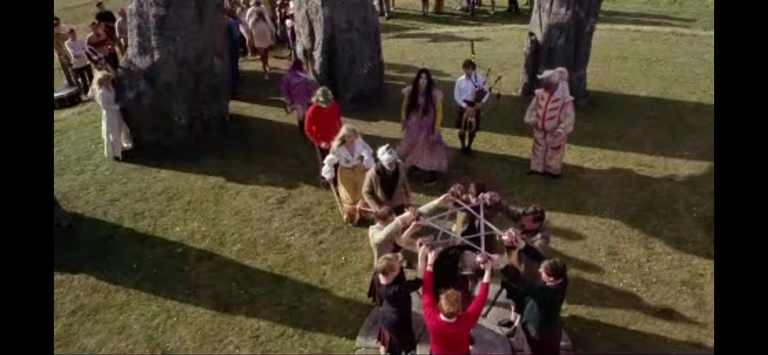
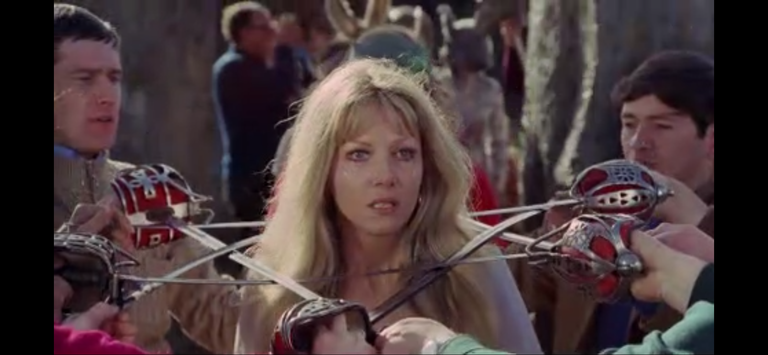
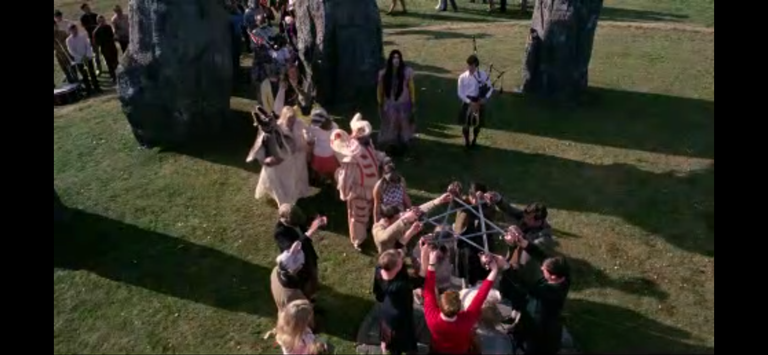
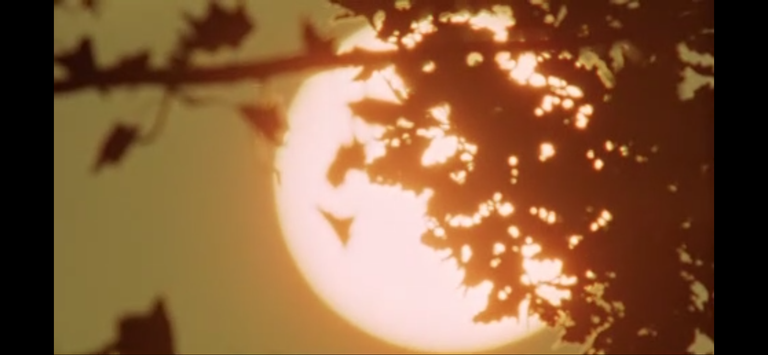
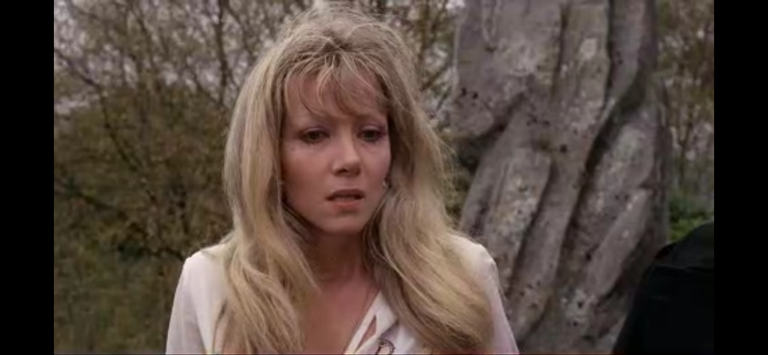
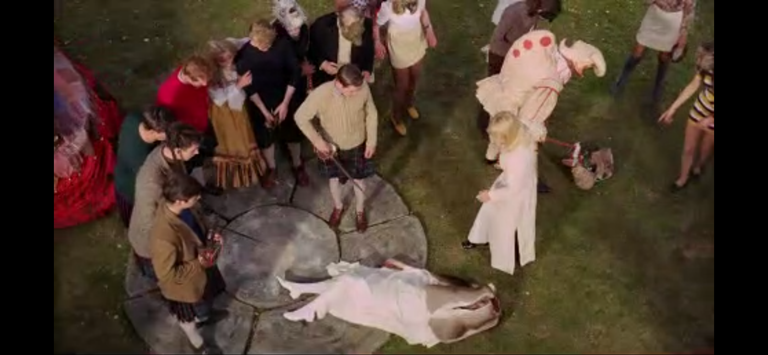
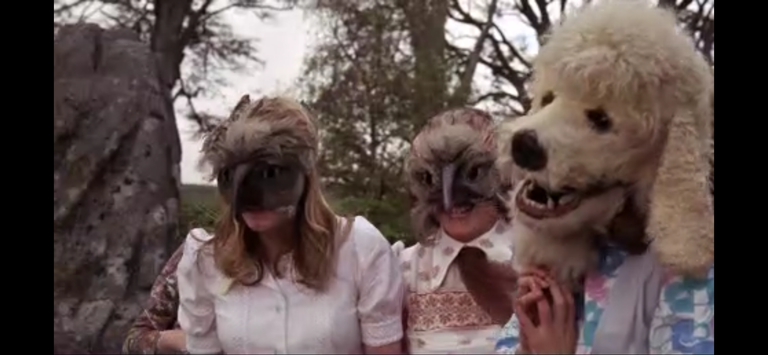
Finally, at the conclusion of the procession, we see the missing girl. She is bound at the entrance to a cave on the rocky cliffs above the sea.
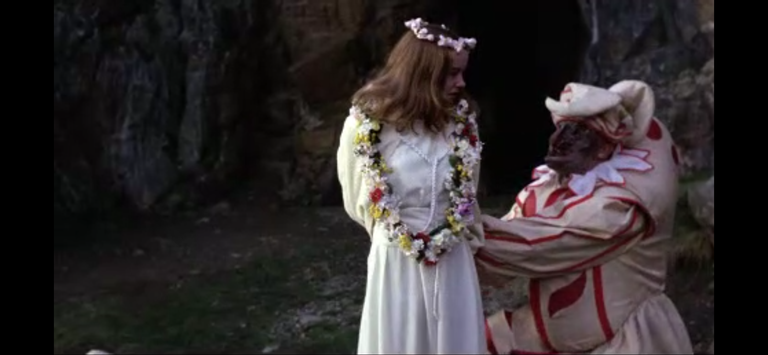
Malus disregards his own safety entirely and runs to her in his Fool costume. He breaks her binds and runs off with her into the caves.
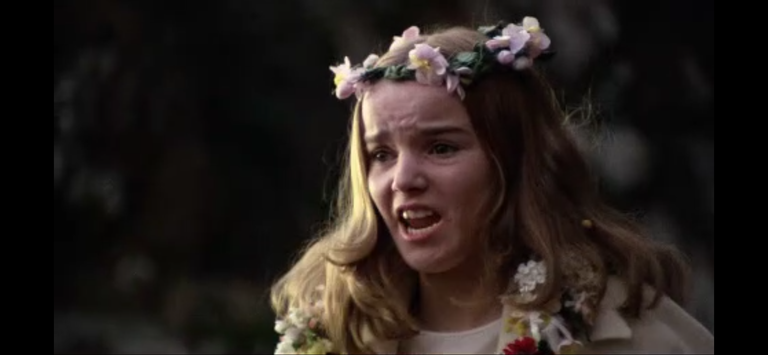
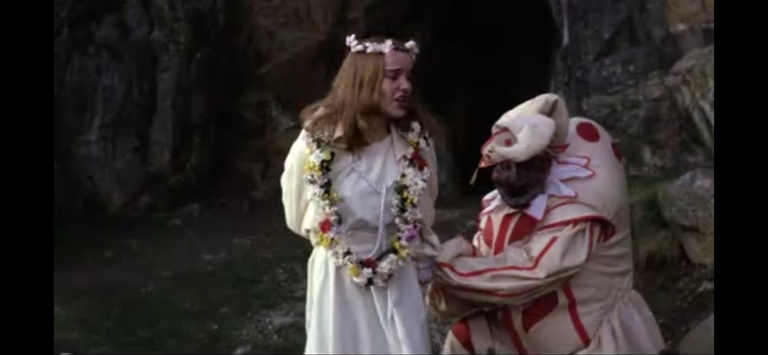
They are followed by one or two, but there seems to be very little effort to actually catch them.

The Revelation:
On the eve of the festival, Malus’s suspicions are confirmed in a shocking twist. As he sneaks around the island, trying to find Rowan, he is captured by the islanders and brought to the Wicker Man — a giant effigy made of wicker, which is central to the festival. Malus is horrified to learn that Rowan is not the intended sacrifice at all. Instead, he is.
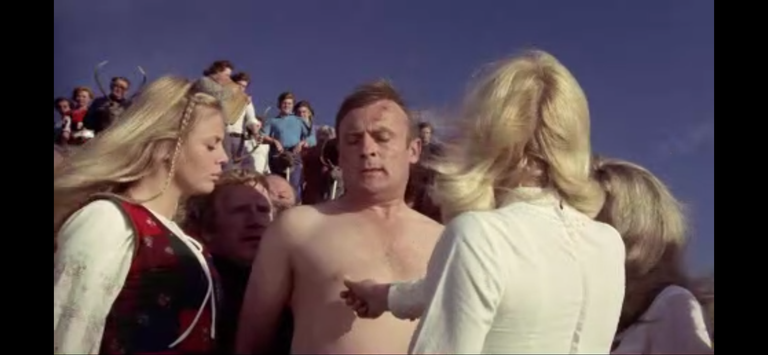
The islanders have orchestrated a complex deception to lure him into a trap. Rowan, far from being in danger, is revealed to have been in on the plot all along. She was never missing — the letter that Malus received was part of the plan to lead him to Summerisle and set him up for the sacrifice. In fact, Rowan has been chosen to represent the Virgin of the Harvest, and her role is to ensure that the sacrifice of Malus, a virgin in the eyes of the pagan gods, will guarantee the prosperity of the island’s crops.
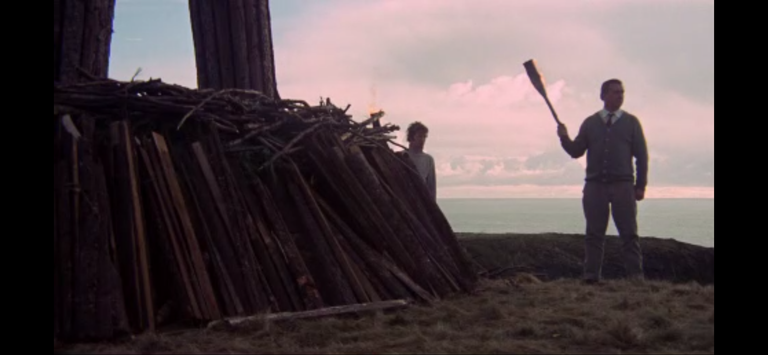
The Final Moments:
As Malus is bound and placed inside the Wicker Man, the islanders chant and celebrate, preparing for the ritual to be completed. The Wicker Man, a massive, hollow structure made of wicker, is designed to hold the human sacrifice. Malus, now fully realizing the fate that awaits him, struggles to break free, but it is too late. His protests fall on deaf ears.
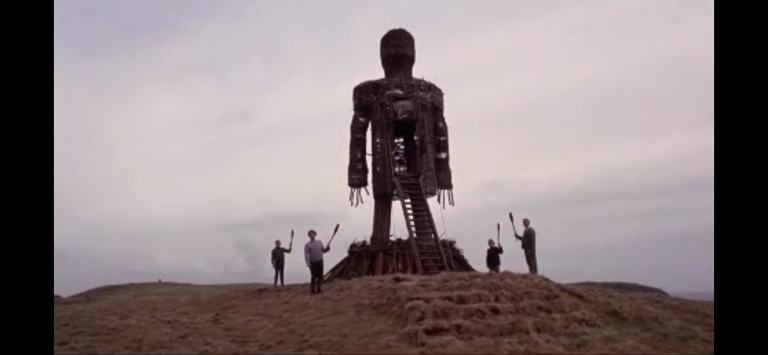
The final sequence is one of stark terror. Malus, still alive inside the Wicker Man, is set on fire. The Wicker Man burns, and as the flames consume him, the islanders celebrate around the structure, dancing and singing, believing that the sacrifice will ensure a bountiful harvest for the coming year.

In his final moments, Malus screams for help, but it is drowned out by the islanders’ chants. As the Wicker Man collapses, the camera pulls back, revealing the burning effigy and the ecstatic faces of the islanders, who are blissfully unaware of the horror of their actions.
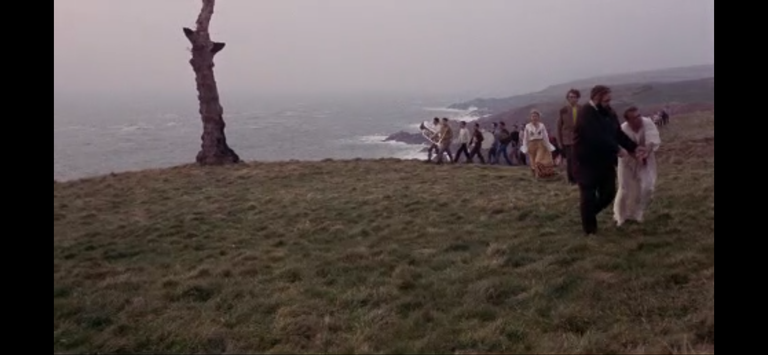
In the final moments, as the Wicker Man burns and Malus screams in agony, the film reveals the shocking truth: the entire investigation, Rowan’s disappearance, and Malus’s involvement in the ritual have all been part of an elaborate plot to sacrifice him to the gods. The islanders' paganism is not a simple belief system—it is a deeply ingrained, manipulative religion designed to control and maintain the prosperity of the community. Malus's death, despite his struggle, ensures the island's survival.
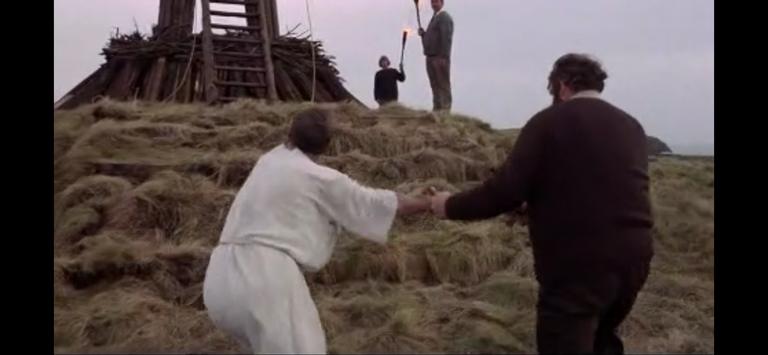
Conclusion:
The film ends with a haunting sense of finality.
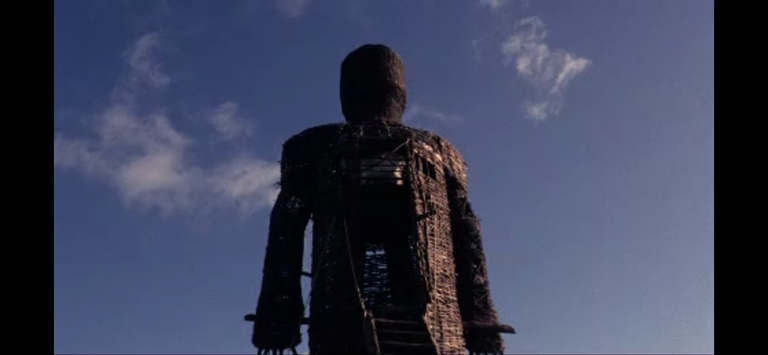
Although modern critics might say that the islanders’ victory is a victory of blind faith and sacrifice, I would say it was a victory of a clever people who used knowledge, wisdom, and some trickery — a victory that ensures their way of life continues, but at the cost of Malus’s life.
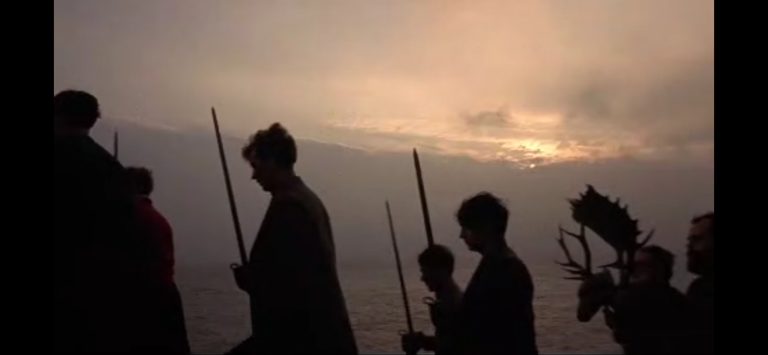
The chilling final image of the burning Wicker Man, with its horrifying symbolism, leaves a lingering impression of ritual, and death.

Modern criticism might suggest that this was the price of believing in old gods, but technically, Malus paid the price for staying faithful to his God.
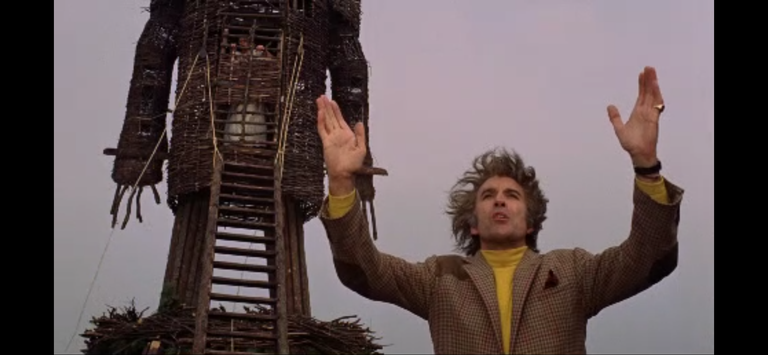
That isn't to say that Malus was a fool. Honestly, had he sacrificed his morals and stayed alive, I think that this would have made him a fool.

The theme I draw from this film, is conviction.
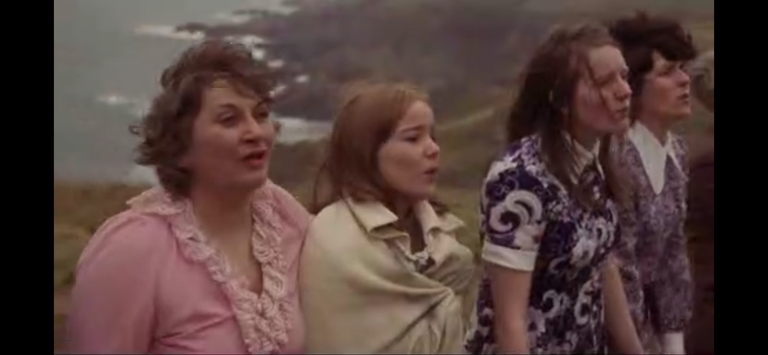
His convictions and their convictions were not the same. There was no way both sets of standards and convictions could coincide on this island without one side either bending or breaking.
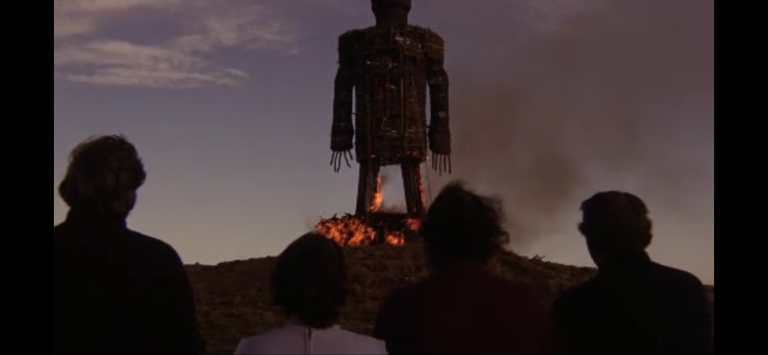
Although I am not pleased to see Malus' defeat, I will admit that part of me celebrated along with the people of Summerisle. Not at the demise of the good and upstanding detective, but at the promise of a returned harvest.
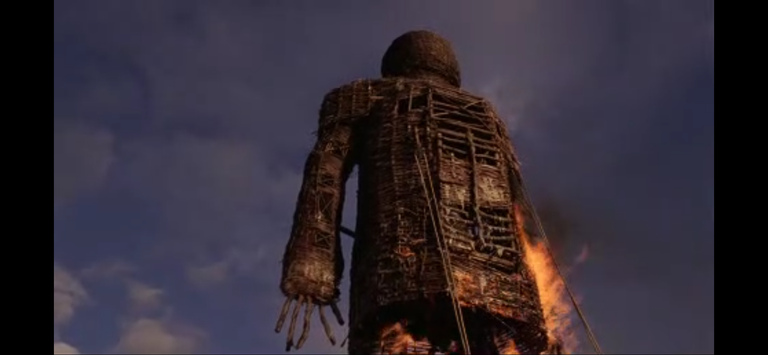
Although I don't think a sequel would be very much good, I would love to see what happened at the next year's harvest festival. Malus made a keen observation, something honestly very closely akin to a curse before he died, as he told Lord Summerisle:
This won't make your crops grow! ...when the crops fail next year, it will be YOU who is sacrificed!
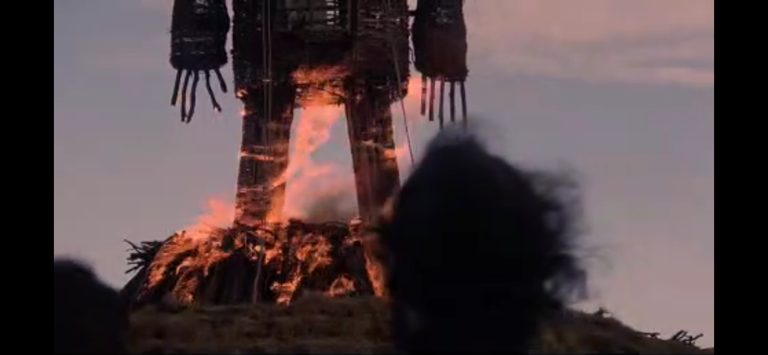
I feel somehow guilty admitting this, but I really in that moment wanted to see the crops succeed with a massive harvest in the season to come.
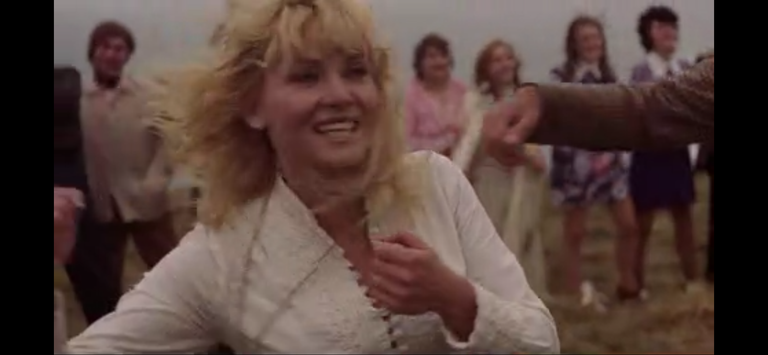
Malus was a solid and upright character. He was easy to admire, to trust, and in general, to find agreeable and likeable...but his personality also lacks a certain dynamic that comes with feeling freedom. Although he embodies so many respected virtues, it diminishes the character of his personality to something rigid and stiff.
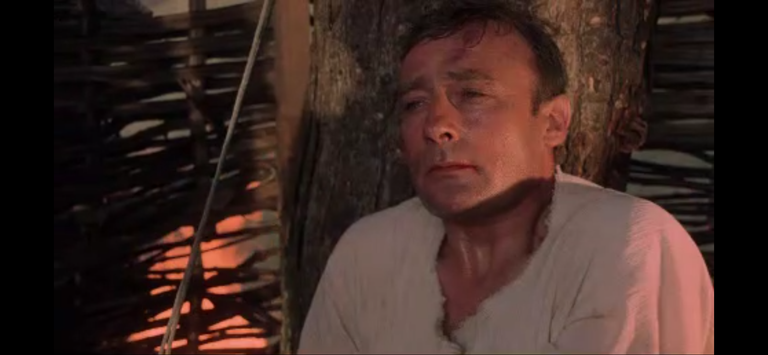
I find it hard to picture Malus behaving differently at home with his bride-to-be, or at a department Christmas party or whatever. He's like a more likeable Javert (Les Misérables), but only more likeable on the surface, because truthfully I don't think many people would find enjoyment in his company.
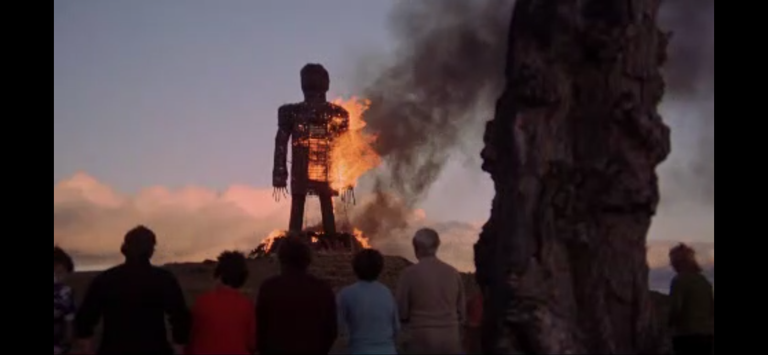
For me, this presents another dichotomy which cannot seemingly be resolved into one. The Malus/Javerts of the world are on one side, compliant, virtuous, moral, upstanding, and steadfast. We like the sense of security that comes from these traits, but in them can be found no life, no spontaneity, no joy freedom or true expression. The Pagans, on the other side, have life and spontaneity, joy, expression and freedom, but they live without a sense of security, without so much order.
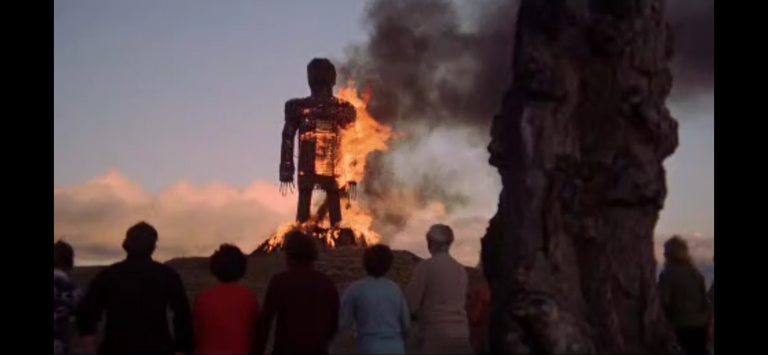
It would seem to me that these freedoms would have made the Pagan peoples of old into quite fearsome warriors. Then I question, if they are as good at trickery and deception as the movie implies, is it not possible that they used the same forms of trickery over the years to begin winning wars without fighting them? What if there are large Pagan influences over us even now, that we are unable to see?
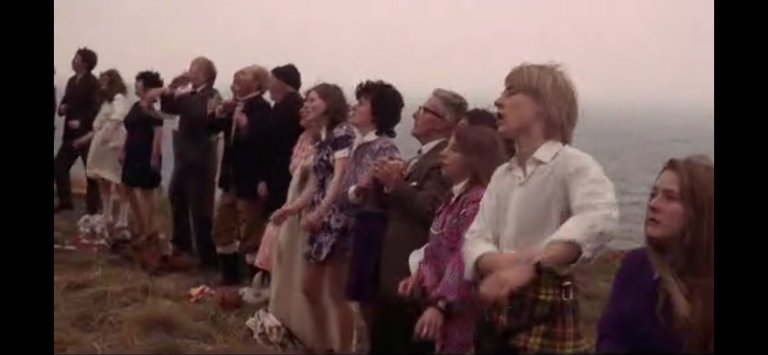
What if, the stories we are told about these bloodthirsty sacrificial communities are just false narratives? I mean, if history is written by the winners, and the winners appear to have been largely Christian, who's to say the stories we hear about the vanquished Pagans are even true?
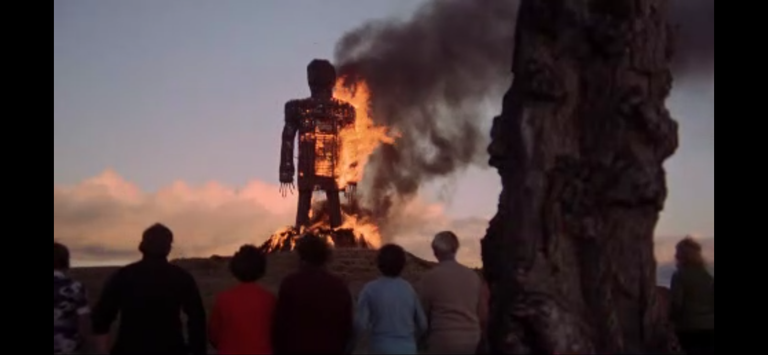
What if the Pagans of old are actually the Tartarians, great, powerful, and yet almost completely removed from the annals of history? What if they had created a world based on the motto Give back to the earth, more than you take, and had created civilizations based on freedom and joy and spontaneity and life? What if these ideals made it so difficult to enslave people en masse, that the entire history of their civilization had to be demolished and subjugated until people had no memory of their former glory? I mean, ...I'm just saying.
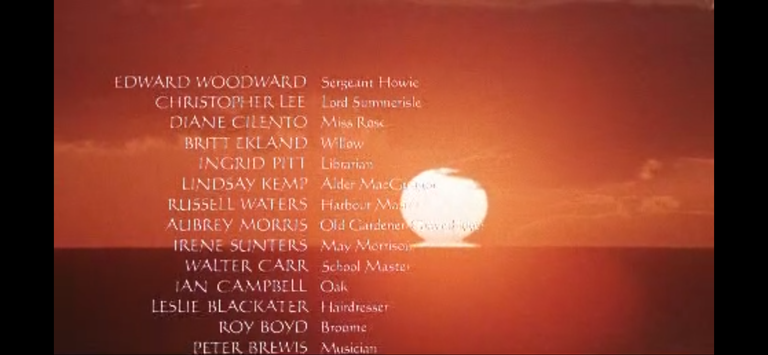
Honestly, I do feel bad for Malus. He's a good and honorable man, he is kind and morally upright...but these pagan themed "horror" movies honestly tend to strike a different chord for me. I tend not to feel horror in movies like this (and, say, Midsommar (2019), for example), but rather, a kind of reverence for these communities. I don't walk away from the movie feeling the intended chill of terror, but instead, I think, those guys were pretty cool.
Some thoughts stick with me at the conclusion of this one, the first of which, which kind of twisted my mind up in a bit of quandary, was that he would have been unfit for the sacrifice if he would have just boned Willow back at the inn. By trying to seduce him, was she trying to save his life? Or was it her task to use seduction to verify the strength of his moral character? Also, if he had banged her, although he'd likely have been sent home, he would have been unable to contain the shame and secrecy, so his life ultimately would have been undone anyway. In this way, the film spoke to me of the honor of the Pagans, but also the honor of the opposing Christians. He chose to uphold his morals and ultimately that cost him his physical life, but enabled him to keep his dignity and character intact. Would he have done differently if he would have known? I think it's easy to make poor decisions when there is that kind of pressure. Honestly, dying with his beliefs and honor firmly fixed, was probably better than cannibalizing his own morality in exchange for a few more days of life...but had he been given the same choice consciously, I wonder if he would have had the clarity to make the same decision...it's like a no-brainer version of the would you rather game.
Would you rather bang this hot Swedish chick, or be burned alive as a human sacrifice? LOL - but while this sounds obvious on the surface, truthfully, it was being burned alive that enabled him to sacrifice his physical body in exchange for keeping alive all the things he held sacred...I can't get my thoughts on this into a coherent vignette, but I think I've clunkered and belabored my way to something at least resembling my point.
This movie was a lot of fun to watch. I personally really liked the Pagan community and have become inspired to see if I can find more old timey movies with Pagan themes to review and share.
<<< AZL MOVIE REVIEWS >>>

Thanks for checking out some more of my work! As always, I hope you enjoyed witnessing as much as I enjoyed creating!
© Photos and words by @albuslucimus, except where otherwise indicated.

source

Bro, i hated this movie so hard. I love a crime theme movie. And to now that this was alongside Midsomar with the cult theme sold it to me. But... I heard for the year it came out this flick was like... Revolutionary for some reason. But the execution killed it for me...
LOL! I can totally see that too honestly, and well said. The big advantage this had for me, to help it overcome what it certainly does lack in execution, was the arbitrary fortune of its vintage and my interest in old architecture and old interpretations of cultures…as a sneak peak into someone’s version of a modern pagan culture, fairly cool even if it is a bit contrived, which it certainly is (like the chick with the egg or whatever in the cemetery). As a murder mystery/suspense, no I agree I am not seeing that at all. Honestly that is a much more concise and effective way of saying what I was trying so desperately to say about it in the post. It’s not suspenseful or scary, but an interesting account of another culture, with the high likelihood of pure speculative fiction 🤣
ok ok, you had a particular reason to enjoy this one -jajaja- i feel you. BTW i saw there is a remake with Nick Cage and the critics destroyed the movie. I don think i'll be watching that one any time soon XD